- Affiliate Notices
- Privacy Policy
- Work with Us
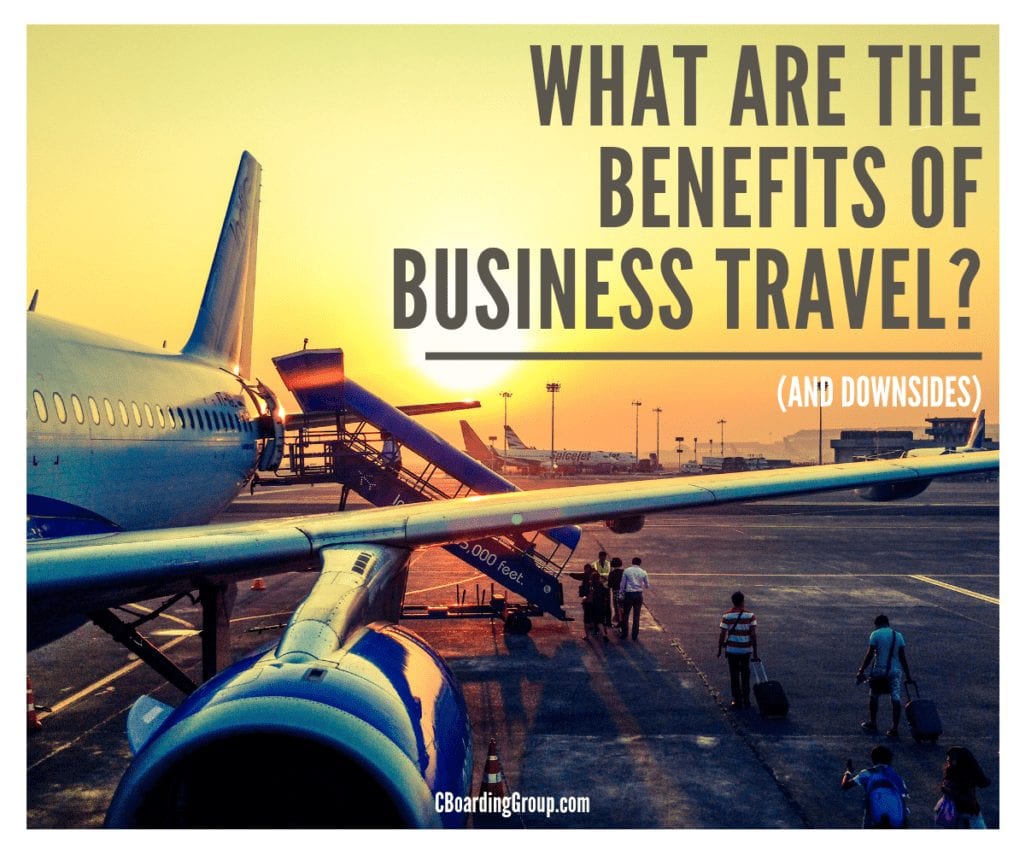

What are the benefits of business travel (and downsides)?
Congratulations. You just took a job that includes 25% travel (or maybe 50% or even more) . But you’ve never really traveled before and frankly you are a little unsure if this is a good career move or not. In this post I cover benefits of business travel as well as some of the downsides.
Before we get too far let’s define business travel. Here’s how we define it :
Business Travel is when employees travel (fly, drive, train, etc) for some company related activity. Often this involves meeting w/ a customer, visiting a project site, installing something, training, or meeting w/ staff in other locations.
Wikipedia has a more straightforward definition that we like to:
Wikipedia defines business travel as: “ Business travel is travel undertaken for work or business purposes, as opposed to other types of travel , such as for leisure purposes or regularly commuting between one’s home and workplace.” I think this is a fair definition of business travel.
There are no shortage of jobs where frequent travel is a key element . But, when considering a job that has frequent travel it’s important to look at the pros and cons. What are the benefits of business travel? To you? To the company? What are the downsides? In the remaining sections we examine these very questions.

The Benefits of of Business Travel
Let’s start first with some of the benefits of business travel…and there are many:
- You will raise your profile inside your firm . Being willing to travel lets management know that you are an all-in kind of employee, willing to go the extra mile. It will start to let them view you as more than just a “doer.”
- You will be exposed to higher profile projects . By traveling you will likely get to visit and be involved in higher profile projects. For example, I got my big break by traveling unexpectedly to a customer’s site where an install was going wrong. I was with the CEO, the head of Sales, and the big dog’s from the customer. Great exposure. Especially when I delivered.
- You will learn to be flexible . Traveling involves a healthy dose of “crud, that happened.” You got to roll w/ the punches and travel will help keep you flexible which is always a good thing for the business world.
- You will meet new people inside your firm . I like this the most. Lots of good network opps on the road and the chance to build your virtual Rolodex.
- You will get 1:1 time with important people in your company . I spent 4 hours in a car w/ our national sales director – excellent bonding time. We now trust each other and I have an internal coach when I needed one. When you are on the road you often will be there 1:1 with key members of the firm. I once picked up and dropped off the CEO from the airport. Later he hired for me a very senior role.
- You will rack up points and miles that you can use to book personal trips . If you gonna travel you might as well get the points. Use those points to pay for your personal or family vacations.
- You can brag to your friends (via Instagram, of course) about your “glamorous travel life .” Hey, it’s not that glamorous, but what do they know. Give ’em the ole duck face photo at the Hampton Inn in Bismarck, ND and throw a sweet filter on it. They will think you are living the good life. #Sarcasm. Or if you are actually at some place sweet those photos will be awesome. #Millenial (not me!)
- You get to see a lot of interesting places (bucket list!) . Through business travel I’ve been able to visit almost all 50 states, and check off quite a few bucket list destinations. Sometimes you gotta rush through them given the business constraint, but its still far more economical than you could do on your own.
- You will gain a more global (or at least “National”) view of the world / country . If you live on the left coast (like I do), you might have a tendency to get a skewed view of the universe. I’ve spent so much time in all parts of this country that I know that there are equal parts good and bad people everywhere. Travel will bring you into contact with all kinds of folks.
Be sure to read: 147 Business Travel Tips – the ultimate list of road warrior tips & tricks
The Downsides of Business Travel
Yes…it’s not all glitz and glam and unicorns. In fact, often it’s not. Here are some of the downsides of business travel:
- Time away from family . This is the biggest drawback. And one I’ve struggled with. I love my family and I love providing for them. I know for a fact that I could not provide the same quality of life that I do today if I didn’t have a job that involved business travel. All the same, it totally sucks being away from your family.
- The hassles of business travel . Non-business travelers often think the business travel life is glamorous. And I suppose that parts of it are (like getting a sweet upgrade to first class), but the reality is that it’s a job and it has its own daily grind. You are cramped in airline seats, shuttling from one location to the next, tired, etc.
- You will be tired . Different time zones, jet lag and having to the “up” and “on your game” for you client meetings is taxing on the body. You learn to live with, but it’s still difficult.
- You will occasionally miss your kids events . This sucks. No two ways about it. I’ve made more events than I’ve missed, but sometimes you will miss a soccer practice or a midweek game. Not fun.
- You will travel to places people don’t really want to visit (like Minot, ND) – but I see this as an upside, honestly.
- You will be alone a lot . All of those bucket list places are often done alone. I’ve seen cool lighthouses…by myself. I can honestly say while it was cool to see, I wished my wife was with me. It would have made it so much better. At the end of the day, you are alone in your hotel room with your email and your TV.
For more thoughts on the downsides of frequent travel consider these articles:
- Travelling for Work: The Dark Side of Work Travel
- 9 Crazy Myths About Business Travel – Debunked!
- What to do on a Business Trip Alone – 7 Ideas to Never Be Lonely on a Work Trip
- Travel Tip Tuesday #19: Staying Connected is Important (to your loved ones!)
Final Thoughts on the Benefits of Business Travel
There are a lot of pros and cons to business travel. I have been doing it for many years and the impact it has had on my career has been significant. The world is pretty flat these days and many corporate jobs require some level of travel.
If you want to really advance in your career it is better to embrace the benefits of business travel. Find a supportive partner (my wife is amazing and we have a great routine! I could not do this job w/out her) and jump in headfirst. Your career will thank you.
Don’t forget to read my post on 11 Tips to Crush your First Business Trip for ideas on how to get the most out of your first experience and to avoid making those rookie travel mistakes.
By the way, if you are interested in more travel tips and travel advice, you might be like these great articles:
If you liked this content, please do us a favor share it on social media and click the “like†button below and don’t forget to follow us on social media including Twitter , Instagram , Pinterest and Facebook .
And, of course, if you are interested in more travel tips and travel advice, you might like these great articles:
- 147 Business Travel Tips  – the ultimate list of road warrior tips & tricks
- 31 Amazing Hotel Hacks  Travel Pros Use all the Time
- 53 Amazing Gifts for Business Travelers  in the 2020 Gift Guide for Travelers
- 9 Healthy Travel Snacks  – eat smarter on the road
- Product Review: OGIO Metro Backpack , The Business Traveler’s Backpack
- Ultimate Bitcoin Travel Directory : How and where to use crypto for travel
- How to buy a hotel mattress
- How to buy a hotel pillow
- How to buy hotel sheets
- 101 Travel Hacks for the Business Traveler  – the Best Business Travel Hacks
- 26 Must Have Travel Gadgets & Gear  to add to your travel kit
- The Ultimate List of the Best Travel Blogs 2020  Edition
- The Mileage Run  – A Frequent Flyer Travel Hack You Need to Know
- Top backyard water toys
- Best backyard games
- Top travel pillows
- Best travel purses
- Best luggage tags
- Best travel thermometers
- Where to buy face masks for travel
- Travel necessities
- Best travel games
- Best travel books
- Best packing cubes
- Anker PowerCore 200100 Review  – Should I Buy?
- Hilarious Travel Memes
- Why Frequent Travelers should buy their Travel Size Toiletries in Bulk!
- 3 Letter Airport Codes  – their history, funny ones and more
- Top Travel Pillows  – the best travel pillows for 2019
- TSA Drone Policy  – do they have one?

Affiliate Disclosure: As an Amazon Associate I earn from qualifying purchases. I may also earn commissions from other affiliate programs as applicable.
Jeremy Ballou is the editor of the CBoardingGroup.com and a long-time writer in both the travel and tech industry. Most days he's in thinking about travel or writing about it.
Travel Tip Tuesday #21: How to Fold your Towels like the Hotel does!
Steam clothes in shower to avoid ironing, you may also like, demon dentist freaks out and removes clothes at..., five days in slovenia: a guide to the..., can i fly with an expired license, what is a redress number and do i..., how to make your bed like a hotel..., how to stop your ears from hurting on..., the traveler’s first aid kit: how savvy business..., 11 tips on traveling with your boss –..., 23 jobs with travel: the ultimate list of..., deal alert: rockland wheeled underseat carry-on 72% off.
Enjoyed this article and it’s great that you have been able to travel on business for a long time.
One downside I’ve noticed is marital splits.
Thanks so much! And yes heavy travel can be rough on the marriage. No doubt about it.
I like the idea that I’ll be likely to get involved with higher-profile projects with business travel. My boss is offering me this opportunity since he told me that I have the potential to take over his place when he retires, and he wants me to get started as soon as possible with traveling on all parts of the country. If I were to choose, I’ll look for a company that posts business class travel fares so I’ll know how much I should put for the travel expenses when I begin my training.
You should definitely take advantage of it!
Leave a Comment Cancel Reply
Save my name, email, and website in this browser for the next time I comment.
- +1 844-999-5003
- [email protected]

Pros and Cons of Business Travel
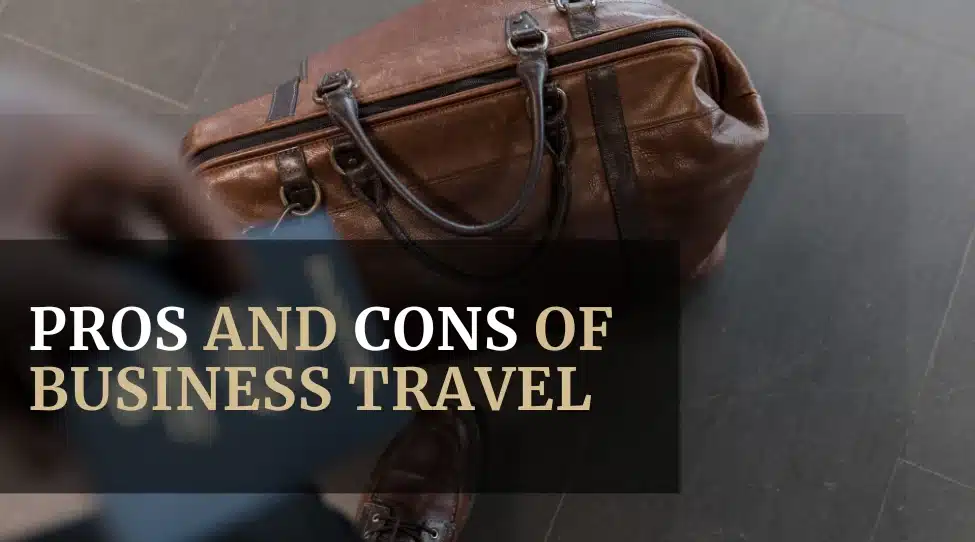
Inspired Travel Group is a full-service corporate travel agency servicing clients right the way across North America. Our people first approach to travel ensures only the highest levels of personalized, attentive service.
Interested?
Table of contents.
Business travel is an integral part of the professional landscape, offering avenues for networking, client engagement and market exploration. Despite its manifold benefits, navigating the realm of business travel involves overcoming distinct challenges. Professionals commonly reach a crucial point where they must balance the potential for career growth with the imperative to reduce stressors and maintain a sense of work-life equilibrium.
In this article, we examine the positives and negatives of work-related travel, shedding light on the different aspects that professionals typically come across.
Pros and Cons of Business Travel:
Business expansion, professional networking, skill development, time away from home, health and well-being, expense and logistics, pros of business travel.

One of the primary advantages of business travel is the opportunity it presents for business expansion. Face-to-face meetings foster stronger connections, helping establish trust and credibility. Being physically present can make a significant impact when negotiating deals or forming partnerships. The ability to understand local markets and cultures firsthand can be a valuable asset in expanding a business beyond its familiar borders.
Try Our Elite Travel Management Service Fee Free For 3 Months
Business travel catalyzes professional networking. Meeting industry peers, potential clients, and collaborators in person allows for genuine relationship-building. These connections often extend beyond the confines of formal meetings, offering opportunities for spontaneous discussions and brainstorming sessions. Networking events and conferences become platforms for sharing insights, gaining exposure to new ideas, and staying abreast of industry trends.
The challenges encountered during business travel contribute to skill development. Navigating unfamiliar territories, managing unexpected situations, and adapting to different working environments foster adaptability and problem-solving skills. Professionals learn to think on their feet, enhancing their decision-making abilities. Exposure to diverse cultures also cultivates intercultural competence, a valuable skill in today’s globalized business landscape.
Cons of Business Travel
A significant drawback associated with business travel is the considerable time spent away from one’s home base. The combination of extended trips, frequent flights and prolonged stays in hotels can contribute to a sense of disconnection from family and home life.
This strain on work-life balance has far-reaching consequences, impacting not only the traveler but also their loved ones. Effectively navigating and balancing professional commitments with personal responsibilities becomes a formidable challenge under these circumstances.
The demanding nature of business travel can exact a toll on an individual’s health and overall well-being. The irregular schedules, persistent jet lag and exposure to diverse climates often result in heightened levels of fatigue and stress. The endeavor to maintain a healthy diet and consistent exercise routine while constantly on the move presents a significant challenge.
Over time, the cumulative effects of frequent travel can contribute to burnout, impacting not only physical resilience but also taking a toll on mental health. Effectively addressing these challenges is imperative for sustaining a robust well-being amid the rigors of a travel-intensive professional lifestyle.
Business travel comes with inherent expenses, including transportation, accommodation, meals and incidentals. These costs can strain a company’s budget, particularly for small businesses or entrepreneurs. Additionally, the logistics of planning and coordinating travel arrangements can be time-consuming. Flight delays, hotel reservations, and transportation issues can disrupt the smooth flow of business plans, impacting productivity and causing potential setbacks.
Balancing Act: Navigating the Pros and Cons
Increased productivity.
Despite its challenges, business travel can significantly contribute to increased productivity. Face-to-face interactions often result in quicker decision-making processes, reducing the time typically spent on email exchanges or virtual meetings.
The ability to address issues promptly and clarify concerns in person fosters a more efficient work environment. The immediacy of communication that comes with being physically present can be a driving force in achieving business goals.
Cultural Understanding
Business travel provides a unique opportunity for professionals to gain a deeper understanding of different cultures. Exposure to diverse customs, traditions and business practices enhances cross-cultural communication skills.
This cultural intelligence can be a critical asset in international business dealings, helping professionals navigate sensitive situations and build rapport with clients from various backgrounds.
Environmental Impact
While business travel contributes to professional growth, the environmental impact is an unavoidable concern. The carbon footprint associated with frequent flights and transportation contributes to climate change.
As companies strive to adopt more sustainable practices, finding a balance between the benefits of business travel and its environmental consequences becomes crucial. Virtual alternatives and eco-friendly travel options are emerging as potential solutions to mitigate the negative impact on the planet.
The decision to engage in business travel involves a careful consideration of its pros and cons. While it offers unparalleled opportunities for business expansion, networking and skill development, the drawbacks, such as time away from home, health concerns, and expenses, cannot be ignored. So, balancing the pros and cons of business travel is crucial for professionals to maximize benefits without sacrificing personal life.
Simplify your business travels with Inspired Travel Group , your dependable Corporate Travel Agency. Let us manage the details for a smooth and memorable journey. Connect with us today to meet all your corporate travel needs effortlessly.
Links to related Articles
- Healthy Tips To Stay Fit During Business Travel
- Stress-Free Business Flight Tips When Traveling To Vancouver
- The 10 Best Business Travel Insurance Options In Canada
Get Started with Inspired!

For those that require a higher level of service
- 844-999-5003
Corporate Travel Inquiry
- Search Search Please fill out this field.
- Corporate Finance
Corporate Business Travel: Everything You Need to Know
:max_bytes(150000):strip_icc():format(webp)/Headshot-4c571aa3d8044192bcbd7647dd137cf1.jpg)
Katie Miller is a consumer financial services expert. She worked for almost two decades as an executive, leading multi-billion dollar mortgage, credit card, and savings portfolios with operations worldwide and a unique focus on the consumer. Her mortgage expertise was honed post-2008 crisis as she implemented the significant changes resulting from Dodd-Frank required regulations.
Corporate business travel involves the movement of individuals representing their organizations for work-related reasons. Whether it’s attending client meetings, industry conferences, or sealing business deals, this practice covers a range of activities essential for professional growth.
In the interconnected global business environment, where face-to-face connections matter, corporate business travel plays a central role in sustaining and expanding enterprises across borders. Businesses face challenges in optimizing this crucial element of their operations. Strategic considerations must be taken into account to use this element of business to its greatest potential.
Key Takeaways
- Corporate business travel can unlock new opportunities for business growth, offering the possibility of reaching new markets, connecting with a wider pool of prospects, or developing brand presence and reputation.
- Traveling for business has many benefits for individuals as well, providing them the chance to meet fellow employees, grow their career by participating in different opportunities, and network within the industry, not to mention experience new destinations.
- Business traveler safety and security are top priorities during corporate travel.
- To ensure that travel goes smoothly and stays within budget, companies should implement corporate travel policies and best practices for employees traveling on behalf of the company.
Importance of Corporate Business Travel
There are many business-related reasons to travel. It can encourage team building, promote learning, offer different perspectives, provide connection to a wider network, open up new markets, and drive sales. And whether or not the trip is for a specific purpose (such as a conference or a retreat), the benefits for employees and companies alike can extend beyond the stated intent of the trip, building confidence, cultural competency, relationships, and company reputation.
Many employees consider the opportunity to travel for work a desirable job perk, as it can offer the chance to venture somewhere that they may not ordinarily go, or to have a trip paid for by their company. And although expenses are associated with travel from a corporate perspective, they may be well worth the return on investment in terms of potential leads or sales—plus, many travel expenses are tax- deductible .
Types of Corporate Business Travel
Corporate travel can take many forms, including the chance for employees and executives to attend events, such as meetings, conferences, industry networking sessions, and fairs. Or a trip may take advantage of educational opportunities such as training sessions, seminars, and workshops. Retreats and guided trips can make for valuable team-building time in new contexts that unlock different perspectives and strengthen working relationships.
Businesses may send their employees to a different location to network, sell, teach, learn from, or generally connect with external contacts or internal employees in regional offices, or to act on behalf of the company in some way.
Additionally, from a client perspective, business travel may occur as a form of due diligence , ensuring that your vendors or suppliers are legitimate, legal, and compliant organizations—for example, traveling for regular audits to confirm that what you think is happening at your supplier organizations is actually happening.
Creating a Corporate Travel Policy
From a company perspective, travel can be a challenge to administer and manage . Costs can easily balloon out of control; travel logistics can be time-intensive to arrange; employees traveling on behalf of the company must be granted a great deal of trust; and like any form of travel, business travel can open up risks to safety, security, and health.
No matter the size of the business or the frequency or complexity of travel, a corporate travel policy can be a helpful tool for any company to set expectations for its employees, communicate guidelines and processes, keep expenses within budget, and streamline booking and logistics.
In creating a corporate travel policy, companies might consider the following for both domestic and international travel, as applicable:
- Purpose(s) of travel
- Which employees are eligible to travel
- Booking and expense approval processes
- Risks and liabilities of travel and how to manage them
- Expectations for employee behavior, including acceptable and secure uses of technology, personal vs. leisure time, communication, and entertainment while traveling
- Eligible expenses for employees while traveling, including per diem rates if applicable
- Determine if employees will be reimbursed for their expenses or given a corporate credit card to use
- Financial tracking, record-keeping, and reimbursement processes
- Acceptable booking practices and costs, including preferred agents or vendors
- Travel insurance
Of course, policies must also be communicated and enforced to ensure compliance and fairness. Including a travel policy as part of a corporate handbook or reviewing it in an onboarding or training module can be a good way to ensure that all employees receive and understand the information. Making it easily accessible for future reference on a shared drive or company portal will encourage employees to refer to it often.
Business travel managers estimate, on average, that spending on domestic and international corporate travel is at 77% and 74%, respectively, of where it was before the COVID-19 pandemic.
Setting a Corporate Travel Policy
:max_bytes(150000):strip_icc():format(webp)/GettyImages-14013409352-16063b976ed14512837ca0fe8bdc536d.jpg)
Corporate Business Travel Best Practices
There are many best practices that both employees and companies can keep in mind around corporate business travel to ensure that it is a successful experience. These encompass everything from administration and financing to employee behavior and well-being.
Booking Corporate Travel
Booking travel can be labor-intensive and time-consuming. To improve the booking process, save on costs, and streamline expense reporting, it can be helpful to designate preferred travel agencies, online platforms, vendors, and lodgings for employees and executives to book with. If the size of the company allows, it can also be helpful to hire an employee or team specifically to oversee and administer corporate travel, or designate this duty as part of an employee’s broader job description.
Managing Travel Expenses and Budgeting
There are many financial considerations when it comes to corporate business travel, and expenses and budgets must be carefully managed to keep costs under control. Many travel expenses are tax-deductible and can be written off, representing potentially significant savings for a company. Setting a budget and clear guidelines for employees about what can be an expense and what cannot is a must, as is creating and enforcing policies and procedures around tracking and reporting expenses.
Many corporate credit cards offer travel rewards and cost-saving opportunities for business travel, as do many other vendors and suppliers in the corporate travel industry. Businesses can take advantage of these to reduce inefficiencies and save on costs.
How to Manage Corporate Travel
:max_bytes(150000):strip_icc():format(webp)/GettyImages-1447025063-e5cd8140937b4bddb5a1c103997e498e.jpg)
Ensuring Traveler Safety and Security
As with any trip, business trips are not without safety and security risks, including the potential for political or civil unrest, crime, illness, injury, accidents, emergencies, natural disasters, cybersecurity breaches, or theft.
To protect their employees against unexpected and undesirable circumstances, at a minimum, businesses will want to have a travel insurance plan in place. It’s also helpful for businesses and employees to undertake some form of travel risk assessment to aid them in navigating potential risks, and outline safety and emergency preparedness guidelines within a corporate travel policy.
Employees should also know how to call if something goes sideways, such as hotel booking issues. A travel agent? A supervisor? If there’s a hurricane, you don’t have a car, and your flight is canceled, can you book another last-minute flight to get around the weather to get home? These details should be planned ahead for.
Maximizing Productivity During Business Trips
The overlap of business and leisure, sometimes referred to as “bleisure,” is one of the main draws of corporate business travel. However, there can also be pitfalls associated with this gray area. It can be difficult to stay productive while working remotely, whether due to the many distractions of a new environment (positive and negative), or because the trip entails an increased workload or time spent away from day-to-day job duties.
Employees looking to manage their time efficiently while away should get clarity on the intended purpose and expected outcome of their trip, and their employer’s and teammates’ expectations for their workload and communication frequency. They can also plan ahead to make the most of their travel time and downtime, and anticipate time zone differences to ensure smooth communication and adjustment to jet lag.
It’s important for employees to maintain work-life balance while traveling on behalf of work. Researching food, entertainment, and fitness options and preparing accordingly can pay off in terms of mental and physical wellness, especially for frequent travelers.
Tips for Business Travel Etiquette
Traveling anywhere, whether domestically or internationally, comes with responsibilities and expectations regarding employee behavior. Perception is one of the most important factors to remember when traveling as a representative of your company. You represent your company out in the public, so you need to ensure you’re displaying any key values that your company represents when interacting with vendors, clients, and peers.
This applies to cultural sensitivity as well. Travelers should do research in advance of their trip to ensure that they can be mindful of local customs and professional etiquette and behave with awareness and respect. Even the basics, such as learning appropriate forms of greeting or how to handle money and payment, and committing a few common words or phrases to memory can go a long way toward demonstrating good intentions and building a new relationship across cultures.
Sustainable and Responsible Business Travel
Recognizing that corporate travel can have a negative impact on the environment, many businesses and individuals are reexamining their travel practices and policies to see where they can make improvements. One example is reducing emissions by booking different means of transportation when possible. In general, seeking out vendors or companies that promote sustainable travel practices and responsible tourism, and that support local communities and ecosystems, can be a good first step to reduce environmental impact.
Technology and Tools for Corporate Business Travel
Software and technology tools can be immensely useful across all aspects of corporate business travel. Travel management and booking platforms; apps for tracking expenses, navigation, or converting currency; and translation and communication tools are all things that employees and businesses alike can take advantage of before, during, and after traveling.
When it comes to technology, it’s important to account for cybersecurity risks and only bring what is necessary to reduce the potential impact of damage, loss, or theft.
Managing Business Travel Expenses
:max_bytes(150000):strip_icc():format(webp)/GettyImages-652153847-592422645f9b58f4c07fcb7a.jpg)
What Is an Example of Corporate Business Travel?
There are many work-related reasons to travel, but many businesses will have their employees travel for conferences, events, sales and networking, seminars, meetings, team building, retreats, and to open up new business growth potential.
How Does Corporate Business Travel Work?
Corporate travel is simply travel for business-related purposes, so the nature of the trip will depend on its length and purpose. Companies whose employees travel frequently on behalf of the business should consider creating a corporate travel policy with information and guidelines for their employees.
Who Handles Corporate Business Travel?
Some businesses employ internal teams or individuals to manage corporate travel and business trips. At other times, employees are responsible for making their own arrangements within guidelines laid out by the company. There are also corporate travel agencies that businesses can leverage to streamline and optimize their bookings and costs.
The Bottom Line
Corporate business travel can be an invaluable path to both business growth and individual career development, building strong relationships and teams. No matter what form it takes, it’s prudent for companies to collect, implement, and communicate best practices for business travel to their employees in a company handbook or corporate travel policy. This should incorporate areas such as expense and booking management, safety and security, productivity, sustainability, technology, and employee behavior and etiquette.
Michela Buttignol / Investopedia
Internal Revenue Service. “ Understanding Business Travel Deductions .”
Global Business Travel Association. “ GBTA Business Travel Industry Outlook Poll .”
Harvard Business Review. “ How to Work and Travel at the Same Time .”
- Terms of Service
- Editorial Policy
- Privacy Policy
- Your Privacy Choices

What is business travel? Definition and examples
If you fly somewhere on behalf of your company, you are one of the millions of people involved in Business Travel each year worldwide. The term business travel refers to traveling for work purposes. We call each journey a business trip . If you drive across town to visit a client, that is not business travel. Business travel is longer.
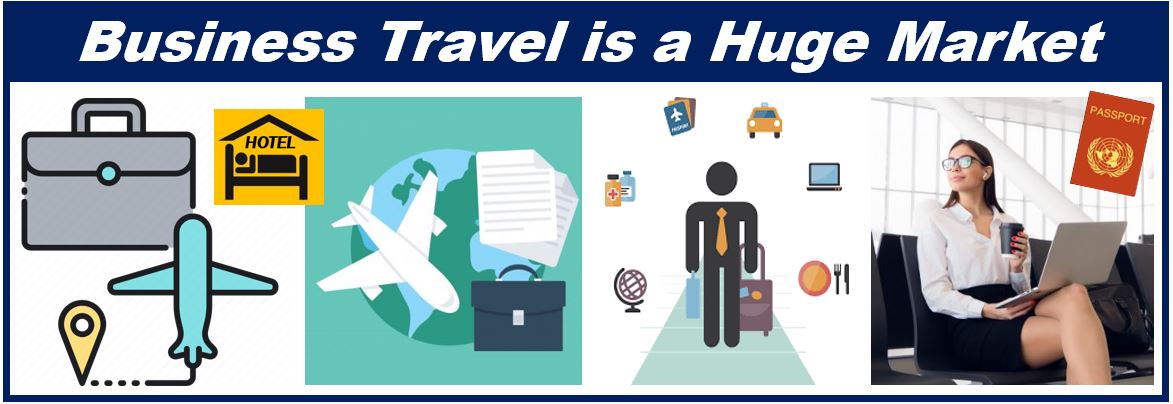
If I say: “John is on a business trip,” we imagine he will be away for more than one day.
Wikipedia.org has the following definition of the term :
“Business travel is travel undertaken for work or business purposes, as opposed to other types of travel, such as for leisure purposes or regularly commuting between one’s home and workplace.”
Why go on a business trip?
There are literally dozens of reasons for business travel. Even if your employer is not a commercial entity, your trips may still be classed as business ones.
What about military personnel who specialize in purchasing defense equipment, missiles, vehicles, and airplanes who are flying to a military air show? Is this an example of business travel? Yes, it is.
So, rather than saying that business travel relates to journeys that are business related, we should say that they are work related.
Below is a list of types of trips people can make for work purposes:
- Attending a conference, convention, or trade show.
- Considering, examining, inspecting, or assessing new markets.
- Evaluating a project site.
- Going for a job interview far away (especially if your are an executive or specialized professional).
- Installing equipment for a customer.
- Meeting with colleagues (from the same company) at a faraway location.
- Motivating your staff to boost employee loyalty.
- Negotiating with suppliers.
- Networking.
- Promoting a product or service.
- Seeing a demonstration of something you may buy.
- Visiting customers.
- Meeting prospects (contacts who could turn into a customers).
- Apologizing to somebody.
Business travel and COVID-19
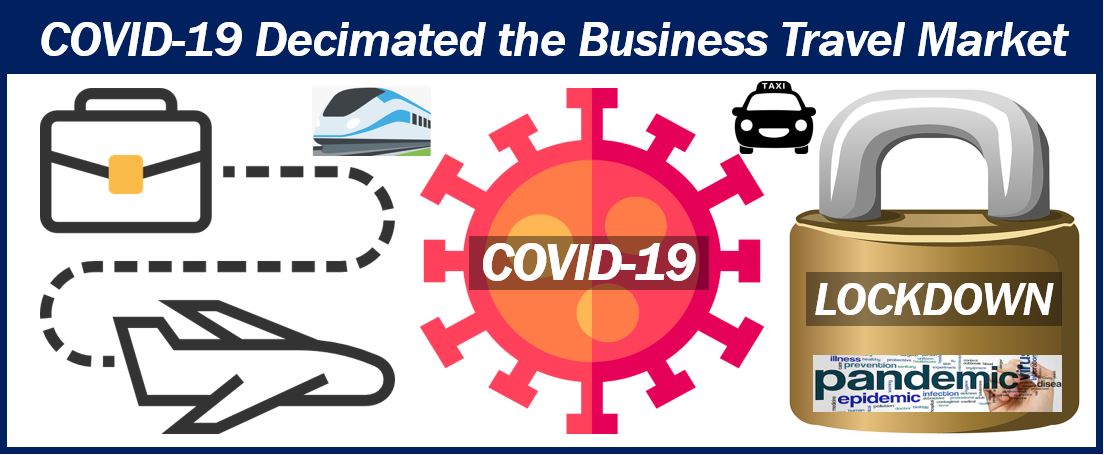
The market for business travel globally is huge. The World Health Organization says that approximately thirty percent of international trips are business-related. Until the coronavirus (COVID) pandemic hit at the beginning of 2020, the market had been forecast to expand rapidly over the next decade.
However, COVID-19 changed all that. The year 2020 saw a dramatic decline in all types of travel, including by air, ship, and land. Business traveler numbers are no exception. As businesses embrace modern telecommunication tools to communicate with employees, clients, suppliers, and other stakeholders, a new trend has evolved – the trend of replacing business travel with online meetings and events.
In August 2020, in the middle of the coronavirus pandemic, Alexander Joe wrote the following in an article we published :
“Business travel has been hit hard during the pandemic. Before you make travel arrangements, make sure that you are permitted to enter your country of destination by checking the latest government guidelines. If possible, it is wise to avoid travel, and if possible, to conduct meetings with colleagues and clients digitally for the time being.”
A permanent trend?
Many conference organizers and airline executives wonder whether this new online trend will prevail after the pandemic is over. Companies have not only found that modern technology is suitable for their needs, but also that communicating online with faraway people is considerably cheaper than face-to-face.
Anything that saves money and helps boost the bottom line is an attractive prospect for CEOs and board members. Bottom line , in this context , means net profit, net earnings, net income, or net EPS (earnings per share).
In a BBC article, Natasha Frost wrote :
“Since the Covid-19 pandemic hit, business travel has ground to a halt. We’ve moved critical client meetings to Zoom, allowed our frequent-flier cards to gather dust and learned how to communicate with colleagues around the world without jumping on a plane.”
“But is this the start of a new normal for business travel?”
Pros and cons of business travel
Traveling is great for broadening the mind and learning new things. However, if somebody has a family, there is definitely a price to pay. Missing family events may contribute to relationship difficulties.
It is also difficult if you don’t have any children but have a partner at home that you like to be with as much as possible.
Many people who travel frequently on business say that they feel lonely while away. Healthcare professionals, for example, have commented that several of their patients who regularly go on business trips show signs of declining mental health, and in some cases, depression.

Jet lag or jet lag disorder is common for people who travel across time zones. Jet lag is primarily a temporary sleep disorder which can make you feel unwell and cause daytime fatigue. Sufferers often find it hard to stay alert and may also have gastrointestinal problems.
If you suffer from jet lag, you have a greater risk of being involved in a road accident. Try to get somebody else to drive if you feel drowsy when you get back from your trip.
If your business travel is successful, i.e., good for your employer, your opportunities for promotion may improve. If you visit branches of your company, you will make new face-to-face contacts. In fact, one of them may offer you an interesting position in the future. Without your trips, this opportunity may never arise.
On a personal note, if you like learning about different cultures and how people abroad go about their lives, business travel is great. Not only do you learn a lot, but you also do it on the company’s expense.
If you accumulate lots of airmiles or reward points, you can use them for big discounts when you take your family on vacation. You may get special concessions from airlines, airports (VIP lounges), hotel chains, restaurants, currency exchange agencies, and car rental companies.
With the advancement of smart technology, business travel is becoming more efficient as travelers can check in, navigate airports, and manage itineraries using their smartphones.

Terms related to business travel
There are many words and expressions in the English language that are related to business travel. Let’s look at six compound phrases that contain the words “business travel,” understand their meanings, and see how they are used in a sentence:
Business travel expenses
The costs incurred while traveling for work purposes. Example: “The finance department requires all receipts to accurately reimburse business travel expenses.”
Business travel policy
A set of guidelines a company establishes for employees to follow when traveling on business. Example: “Before booking your flight, please review the business travel policy for approved airlines and accommodation.”
Business travel insurance
Insurance coverage designed to protect travelers from risks associated with traveling for work. Example: “Given the unpredictability of international trips, our company always recommends purchasing business travel insurance.”
Business travel management
The process or practice of managing and organizing corporate travel. Example: “Our agency specializes in business travel management, ensuring clients have a seamless experience.”
Business travel consultant
A professional who advises on and arranges all aspects of travel for businesses and their employees. Example: “To optimize our travel budget, we hired a business travel consultant.”
Business travel planner
A tool or service used to organize the details of travel for work. Example: “The business travel planner app was instrumental in coordinating the complex itinerary for our sales team’s roadshow.”
Video – What is Business Travel?
This video, from our YouTube partner channel – Marketing Business Network – explains what ‘Business Travel’ is using simple and easy-to-understand language and examples.
Share this:
- Renewable Energy
- Artificial Intelligence
- 3D Printing
- Financial Glossary
The pros and cons of business travel in a COVID-19 world

After rolling the dice with international travel while the Omicron variant is on the prowl, I’m reconsidering my relationship with business trips.
Like many executives, attending events and learning from others around the globe is a key perk of the job. Not to mention it’s instrumental when you are leading a global team. Travel is often a highlight for my year, and with the world finally seeing some light at the end of the pandemic tunnel, my hope is that it will make a return (of sorts) in 2022.
But consider my latest experience a warning to founders and other executives: while COVID-19 is in the headlines all travel will be risky .
I travelled from Dublin, Ireland to Melbourne for a three-week business trip last month. Securing approval from the Australian border control was complex, it took several weeks and as every week passed, flights became scarce and more expensive. However, we still deemed it a worthwhile investment as being on the ground was of paramount importance to our business.
Earlier this year we finalised a merger between CurrencyFair (headquartered in Dublin) and Zai (formerly Assembly Payments, headquartered in Melbourne). Mergers and acquisitions are challenging under the best of circumstances, they are filled with uncertainty for people and that has been compounded by the greater uncertainty of living through the pandemic. Having someone from our leadership team physically in the country was important for demonstrating our commitment to our team, our customers and our business in Australia.
A risk worth taking
I was willing to take the risk of travelling despite the emergence of Omicron, and as (un)luck would have it, inbound traveller restrictions were introduced 36 hours before I departed Ireland. The flight could not be changed without a significant cost outlay and cancelling entirely meant no refund; the flights had been extraordinarily expensive to begin with. The information that was available before I departed was clear that I would need to self-isolate for 72 hours when I arrived, however, the real uncertainty was not knowing what might change while I was in the air.
When I did land in Melbourne, just before midnight on November 30, I was met with very welcoming and empathetic airport staff, but they were completely starved of information or clear instructions from the government. I relayed to the airport staff that I could self-isolate but I was met with shrugging shoulders and directed to the mandatory hotel quarantine queue. Hours later they checked me into a hotel for my 72 hr quarantine after which they handed me my detention notice and asked that I read it carefully in my hotel room. I did read it, in detail, and it verified that hotel quarantine only applied to those who could not self-isolate in alternative accommodation. I immediately alerted the authorised officers who apologised profusely for the mistake made at the airport.
I spent the next three days trying to unwind the situation which I soon learned was impossible.
Once you are in detention, untangling the red tape is a quagmire. I was unable to meet my team or attend client meetings that week and the accommodation I had arranged became an unused sunk cost, not to mention the cost to the Australian government to ‘host’ me. The hotel room did not have a desk or chair (it was too small to fit either), so working on the bed for three days did take its toll. The saddest thing is, it was an unnecessary situation.
The only silver lining is that I was lucky enough to only have to do three days in quarantine with this arrangement. I know others in my sector have done the full two weeks working in a shoebox. And Australia is not alone in this approach; unfortunately, similar situations are happening in Ireland and elsewhere.
However, had I known in advance that I would be in hotel quarantine for 72 hours (wrongfully or not), I still would have travelled. It has been worth it.
The future of business travel
Not all travel is created equal; business travel by nature has a more complex set of considerations. Even before COVID-19, the impact on the bottom line and carbon footprint considerations already had us looking at extended trips to minimise the need for multiple flights in a year. Plus, business travel is a two-sided affair, it requires the people we are meeting (whether clients, partners or colleagues) to be open or able to meet in person.
The re-adoption of business travel will track a different curve to leisure travel. The early re-adopters are taking advantage of the downward pressure that has been put on travel prices. But what will really tip the scale of re-adoption is when companies start to feel that they are at a competitive disadvantage by not travelling.
What excites me is how this will spur innovation in how we meet non-virtually. For those making stops in multiple countries, how might airports facilitate airside-landside meetings for instance without the need to ‘enter’ a country? Airports have already become a destination for shopping and entertainment but have not yet stretched to accommodate business travellers beyond the typical business centres and lounges.
Would I recommend fellow executives to travel right now? Yes, but make it a considered decision.
Develop a minimum viable travel strategy. It does not need to be exhaustive but should cover traveller risk management and duty of care; consider what is acceptable risk and what is not, for example specify what vaccination or infection rates are tolerable before approving travel. Consider working with a corporate travel management agent whose job it is to know what travel policies are in place as they change.
Lastly, getting insurance is wise but most insurers will only cover cancellation costs if you actually contract COVID-19 but will not cover costs if regulations or travel restrictions change. The irony being that when it comes to travel insurance, it pays to get the virus.
Handpicked for you

Relief for Queensland small businesses as border reopens ahead of Christmas

Australia could soon run out of diesel additive AdBlue. Here’s how we can stop that
SmartCompany is committed to hosting lively discussions. Help us keep the conversation useful, interesting and welcoming. We aim to publish comments quickly in the interest of promoting robust conversation, but we’re a small team and we deploy filters to protect against legal risk. Occasionally your comment may be held up while it is being reviewed, but we’re working as fast as we can to keep the conversation rolling.
The SmartCompany comment section is members-only content. Please subscribe to leave a comment.
The SmartCompany comment section is members-only content. Please login to leave a comment.

‘The Signs’ were all there: Why Bluey’s latest episode was a marketing masterclass

Massive tax consequences coming for 42,000 small businesses ‘disengaged’ from ATO

Three Aussie startups, and a fast food chain, that raised $247.5 million this week
‘can’t sit on the sidelines’: albanese promises direct industry support in pre-budget pledge, explainer: what small businesses need to know about accc merger reforms, deadly hair dude gary strachan is the 2024 national small business champion.
Send to a friend
Just fill out the fields below and we'll send your friend a link to this article along with a message from you.
Your details
Your friend's details.
Webinar: Corporate Accommodation in the Middle East: Challenges & Solutions Register now
Blog / Global Mobility / Business Travel & Accommodation: Types and Decision Factors

Global Mobility
Business travel & accommodation: types and decision factors.
Travel is a strategic component of global business. The seemingly simple act of getting from one place to another plays a crucial role in building relationships, nurturing growth, and defining a company’s culture.
Hence, all business travel trends highlight travel is back, with current business travel volume either “more frequent” or “about the same” in 2024 compared to 2019, according to the business travellers surveyed in an August 2023 report from the Global Business Travel Association (GBTA) and Uber for Business.
Business travel and global mobility managers are at the heart of employee movement, professionals tasked with weaving a complex tapestry of schedules, preferences, costs, and objectives into a seamless journey. Their role in navigating contemporary corporate travel’s labyrinth ensures individual trips’ success and serves as a linchpin in broader organisational triumph.
This article will explore the different types of business travel arrangements, which accommodation is best suited to each circumstance and travel, and how it’s all part of one streamlined travel and relocation policy.
Key Factors Influencing Travel Decisions
From the hustle of sales meetings to the spark of business lunches to in-person interpersonal and working relationships to the innovative spaces of trade shows, each type of travel serves a distinct purpose, reflecting the multifaceted nature of modern national and multinational companies.
The latest market trends reveal that live events are the most significant driver of business travel spend in 2024. More than half of travel managers in the United States and Europe cited meetings and conferences as the trigger for increased travel, according to the Deloitte Corporate Travel Study 2023 .
As we delve into the various types of business travel, we’ll explore the objectives and considerations that guide these journeys. Just remember, for numerous reasons, these face-to-face interactions stimulate interpersonal relationships, cultivate more presence, and boost business image far more than virtual communication or video conferencing ever could. Let's now explore why a business traveler might book train tickets, business class flight, or serviced apartment today:
Relocation Travel
Relocation travel goes beyond a temporary assignment; it’s a significant life transition, often marking the commencement of a new role, business process, or project. Relocation can be a complex process. It requires careful planning and support to ensure a smooth transition for the individual and the organisation.
In the agile landscape of modern business, the potential for relocation is an ever-present possibility, underscoring the need for a corporate housing platform , global mobility software , or business travel solution .
Sales Calls and Client Visits
Sales calls and client visits form the bedrock of business relationships, providing essential opportunities for a face to face meetings and front-to-face interaction. Personal connections are important to strengthen relationships and move beyond what digital communication can offer.
Meetings, Conferences, and Trade Fairs
From intimate boardroom discussions to sprawling exhibitions, the intellectual exchange and networking opportunities present during conference travel can shape the future of business sectors.
Training and Development Workshops
Investing in professional growth, training, and development workshops offers targeted skill enhancement and personal enrichment. These gatherings can act as incubators for new ideas and foster a culture of continuous learning within an organisation’s company retreats.
Site Visits and Inspections
Companies send experts on site visits and inspections to provide critical insights into operations, facilitating a tangible connection between planning and implementation. Whether a construction project or a manufacturing facility, these on-the-ground assessments are crucial for quality control.
Team Offsite
Team offsites are curated opportunities for collaboration, professional learning, and creativity, often leading to breakthrough thinking. By removing the daily routine, teams can focus on strategic alignment and build company culture through outdoor activities in a fresh environment.
Incentive Travel
More than mere rewards, an incentive trip is a powerful motivator. These are often tailored experiences to exotic travel destinations or a different city where the organisation can celebrate top performers in a special way outside of the everyday occurrence.
Strategic Planning Sessions & Project Work
These internal meetings, working sessions attend conferences are the engine rooms of a company car and strategy, where lead stakeholders discuss long-term goals and complex projects. Through careful planning and cross-functional collaboration, these gatherings help align resources and direction, driving an organisation’s success.

Accommodation Options for Business Travel
Corporate travel is on similar trajectories in the United States and Europe, with travel managers reporting that spend will surpass 2019 levels in 2023 . As business travel rebounds, selecting suitable accommodation is ever more critical.
In a world where travel demands are diversifying, understanding the nuanced offerings of each accommodation type helps travel managers make informed decisions, ensuring not just comfort but success in every part of the business travel journey.
1. Serviced Apartments
Serviced apartments have emerged as a popular choice among business and leisure travellers seeking the comfort and convenience of a home-like environment, especially during extended stays. These apartments come fully furnished with an equipped kitchen for healthy living and entertaining and separate living and sleeping areas for space and privacy.
Many serviced apartments also include additional facilities like in-house gyms, laundry services, and sometimes even a concierge to assist with local needs. Serviced apartments combine the best of both worlds: The luxury of hotel living with the practicality and comfort of home.
They’re an ideal accommodation option for business travellers, those on short and long-term assignments, and individuals who value the perks of being home, whether cooking fresh meals, working out, relaxing break or hosting friends. Whether it’s a one-week workshop, a corporate trip, or a several-month project, the adaptability and comfort of serviced apartments are hard to overlook.
- Space and Privacy : Serviced apartments typically offer separate living, dining, and sleeping areas, giving travellers space to work, relax, and entertain, all within the same premises.
- Fully-Equipped Kitchens : Travellers can enjoy the flexibility of preparing meals and snacks or hosting small business gatherings.
- Cost-Effective for Long Stays : With tiered pricing for more extended stays, serviced apartments often provide a more economical option compared to hotels.
- Amenities and Services : Many serviced apartments include benefits such as daily or weekly cleaning, Wi-Fi, fitness centres, and 24-hour security, bridging the gap between hotel luxuries and home comfort.
- Limited On-Demand Services : Unlike hotels, some serviced apartments may not offer 24-hour room service or on-site dining options.
- Availability and Location : While growing in popularity, serviced apartments might be less readily available in some locations, especially in remote or less-traveled areas.
- Inconsistency in Standards : Quality and services might vary between providers or properties under the same provider, so thorough research and trusted recommendations are vital.

2. Corporate Housing
Like serviced apartments, corporate housing is intentionally designed for the long-term business guest and offers an even more residential feel and customised format.
Corporate housing offers a tailored solution for business travellers, particularly those engaged in extended assignments, relocations, or large-scale projects. This accommodation are typically located near business centres, making the daily commute easier and maximising productivity.
Unlike traditional accommodation and hotel rooms, corporate housing is designed with the business traveler in mind. The fully furnished apartments or houses come equipped with all the essentials, often including dedicated workspaces, high-speed internet, and various amenities that cater to long-term stays.
One of the notable benefits of corporate housing is the cost-effective nature of this option. By offering a complete living environment, corporate housing can save companies significant amounts on extended stays compared to the rates of conventional hotels.
- Location Proximity : Corporate housing is usually strategically located near multiple offices or business hubs, reducing commute times and providing easy access to essential services.
- Fully Furnished and Equipped : This accommodation includes everything from furniture to kitchenware, making the transition into a new location smooth and hassle-free.
- Cost-Effectiveness : Corporate housing offers a more economical solution than traditional hotels without sacrificing quality or comfort for extended stays.
- Feels Like Home : With more space and personalised options, corporate housing provides a home-like atmosphere essential for well-being during long-term assignments.
- Availability Constraints : Finding the right corporate housing option might be challenging in some locations, especially during peak business travel seasons.
- Less Instant Service : Unlike hotels, corporate housing does not offer immediate services like room service or daily housekeeping, which some travellers prefer.
3. Airbnb and Vacation Rentals
In the vast landscape of accommodation options for business travellers, Airbnb and vacation rentals offer a distinct and occasionally vibrant alternative. These platforms can cater to various tastes and preferences by providing various choices, from urban apartments to remote villas. But the very factors that make Airbnb and vacation rentals appealing can also lead to challenges.
While an Airbnb might work for a small tech startup planning a week-long hackathon in a remote mountain lodge, it would not work for a senior executive traveling alone for crucial client meetings in a major city.
- Wide variety
- Unique, localised experiences
- Easy to book
- Located in remote locations for off-sites
- Inconsistency in quality, service, and safety

Hotels have long been the go-to solution for business travellers, offering predictability, convenience, and a range of services tailored to the professional on the move. They stand as the traditional backbone of corporate travel accommodation, yet they still need to improve.
A hotel can be an excellent option for a marketing executive attending a three-day industry conference in a bustling city centre, but it would be a terrible choice for project managers tasked with two-month assignments or meeting potential clients in new markets.
- Predictable standards and services
- Central location
- Business-specific amenities
- Loyalty programs and perks
- Expensive for extended stays
- Less space and home-like comforts
- May lack local flavour
- Potential extra fees for amenities
5. Short-Term Apartment Rentals
A short-term apartment rental might work for a software developer attending a week-long hackathon in a trendy city neighbourhood. The space provides a creative environment, a full kitchen for meals, and is within walking distance of the event venue, making it a perfect fit for his needs.
However, suppose a sales team planning a series of client meetings across a city over three days chooses a budget-friendly short-term apartment rental. In that case, they might need more reliable internet, insufficient workspace, and a long commute to client offices, resulting in a counterproductive and frustrating experience.
- Flexibility in Location and Style
- Potential for Cost Savings on Brief Stays
- Some Offer Specialised Business Services
- More Home-like Comforts
- Quality may vary
- May lack essential amenities
- Potential compliance issues
- Possible problems with booking and check-in
Catering to Extended Business Trips & Long-Term Assignments
Extended business trips and long-term assignments bring unique challenges and considerations that require balancing costs and complex logistics while providing employees with a safe, comfortable living space. It’s evident from the section above that corporate housing and serviced apartments for the best option for extended stays--they provide home-like comfort, convenience, and safety at a cost-effective price.
However, finding appropriate, cost-effective, serviced apartments and corporate housing available for specific dates can be challenging. Ensuring the available accommodation is safe, secure, and comply with company policies is nearly impossible. Outside of finding the actual totals, travel and global mobility managers oversee all bookkeeping, including tracking expense and business travel trends , approving individuals’ travel costs, and executing the duty of care.
But there is a business travel solution : Partner with a modern corporate travel accommodation or global mobility software provider. By leveraging technology, a corporate housing platform can help stakeholders find suitable accommodation, book it, track costs, keep everyone safe, and ensure the stay is pleasant and productive.
Modern corporate travel management platforms will have the following functionality:
- Real-Time Availability and Booking for Business Travellers : Allows for instant booking of suitable accommodation, notifying managers for approval, and confirming availability and bookings to travellers.
- Live Stats Dashboard and Reporting on Corporate Travel : Utilises technology for accessible reporting, providing maximum visibility and data analysis of corporate accommodation activity and spending.
- Diverse Business Travel Accommodation Options : Offers a wide selection of accommodation types to empower choice and cater to diverse needs.
- Business Trip Safe and Compliant : Allows managers to review and select business accommodation options with confidence, ensuring safety, quality, and security.
- Dedicated Customer Service and Success Teams : Provides personalised support and assistance, ensuring a smooth process from booking to stay.
The landscape of extended business travel requires a multifaceted approach that considers comfort, cost, convenience, compliance, and more. Organisations can easily navigate these complexities by embracing real-time booking, comprehensive reporting, diverse options, dedicated support, and safety measures.

Key Takeaways
Navigating the multifaceted landscape of business and leisure travel and accommodation requires thoughtful consideration, strategic planning, and a keen understanding of organisational goals and individual needs of potential customers. Here are the key takeaways from our exploration:
- Understand Intention Behind the Business Trip : Recognising the unique objectives and demands of different travel experiences, from sales trips for startups to relocations for multinational companies, helps tailor strategies that align with organisational success and personal well-being.
- Explore Accommodation Options : Whether it’s serviced apartments with their home-like comforts, corporate housing with strategic locations, hotels with predictable standards, or short-term apartment rentals with flexibility, each accommodation type has its pros and cons. Understanding these options helps inform decision-making for everyone, from long-term transfers to short-term stays for corporate events.
- Cater to Extended Stays and Long-Term Assignments : Extended business trips bring challenges, such as finding suitable accommodation, compliance, and logistics. Corporate housing and serviced apartments are versatile solutions, offering home-like comfort, cost-effectiveness, convenience, and strategic locations.
- Embrace Technology and Support : Utilising real-time booking, comprehensive reporting, and dedicated customer service ensures a smoother process from planning to staying. Technology and human support work hand-in-hand to enhance the travel experience.
- Balance Cost and Convenience When Making Travel Decisions : Achieving a seamless travel experience requires a nuanced balance between company objectives, individual preferences, cost considerations, and cultural insights.
- Emphasise Sustainability and Alignment with Corporate Goals : Aligning travel options with corporate sustainability goals and environmentally conscious living reflects a responsible approach to business travel, resonating with modern values and societal expectations.
What does travel accommodation include?
Travel accommodation typically includes a room with essential amenities like a bed, bathroom, Wi-Fi, and possibly extras such as a kitchenette or fitness center.
Can I use Airbnb for business travel?
Yes, professionals can technically use Airbnb for business travel if their organizations’ specific travel policy allows it. Airbnb built a program called Airbnb for Work to meet lodging needs. While Airbnb attempts to provide localized experiences for short-term business trips, corporate housing offers more comprehensive solutions for everything from brief business stays to extended relocations.
What is a business travel hotel?
A business travel hotel is designed for professionals arranging business travel, featuring amenities like high-speed internet, working desks, business centers, and meeting rooms. However, c orporate housing offers a cozier and more cost-effective alternative to hotels for business travelers—it strikes a balance between the homelike environment that supports productivity and well-being and the practical considerations of cost and location that are paramount for business travel. These fully furnished apartments are an ideal choice for extended business trips or relocations.
What are types of business travel?
Types of business travel include Sales Calls, Client Visits, Conferences, Training Workshops, Site Visits, Team Offsites, Incentive Travel, Strategic Planning, Project Work, and Relocation Travel.
7 Top Relocation Management Software Platforms to Streamline Relocation
Let's talk.
Previous Article
Seamless Accommodation Management: AltoVita's Curated (Fully Managed) Flow
Next Article
On Demand Webinar: Uniting Global Talent Mobility and Business Travel — Watch Now
Related articles.

15 Best Corporate Travel Tools For Flights, Housing & More!

Corporate Housing vs Airbnb: Pros & Cons for Business Stays
Examining the Pros and Cons: Is Business Travel Worth It?
by amanda | May 28, 2023 | Business | 0 comments
Business travel has long been a source of debate. There are both pros and cons to consider when considering business travel; one way of doing this is weighing the rewards against time and money costs. From networking opportunities to business insights gained in new places – there can be numerous positives associated with traveling for work purposes; but are the potential downsides worth the extra hassle? In this blog post we will examine both sides of this coin to provide a definitive answer as to whether business travel is worthwhile.
Pros: Increased Networking Opportunities
Business travel offers businesses many networking opportunities with potential clients, partners and industry contacts. Meeting in person to forge relationships that lead to long-term business partnerships can only serve your company well in its success over time.
Pros: Gained Valuable Insight in New Places
Travel can give you exposure to different cultures and experiences that could offer valuable insight into new markets or strategies. Understanding regional differences when doing business globally is vital – these insights gained on the road can give your competitive edge back home while improving decision making back home.
Pros: Take Time for Self-Reflection
Business travel provides the perfect opportunity for reflection. In addition to networking and insight gathering, traveling gives business leaders a chance to reflect on their business operations, identify what’s working well and make adjustments where needed – it can even offer much-needed relief from everyday pressures of running a company!
Pros: Expand Your Horizons
Business travel offers the chance to discover new lands, meet interesting people and experience different cultures – all while broadening your horizons and opening up new avenues of growth and development.
Cons: Stress on Pocketbook
Business travel can be costly. From airfare, hotel stays and rental cars to meals and incidentals – expenses quickly add up when traveling for business purposes. But these expenses need to be balanced against potential rewards like networking or gaining valuable insight in unfamiliar locales.
Cons: Stress on Schedule
Traveling for business can put significant strain on both time and energy resources. You must consider possible delays due to weather, lost baggage or security lines when scheduling meetings – plus trying to balance work demands while away can leave little room for rest or relaxation!
Cons: Road Safety
Traveling alone for business trips can present certain safety risks, particularly if traveling to unfamiliar places. It is wise to conduct research and prepare in advance so as to minimize risks, remain aware of your surroundings, and remain informed. Also ensure you have an experienced lawyer on board should any legal issues arise. For instance, if there’s an accident involving trucks you should immediately consult a truck accident lawyer for advice as soon as possible.
Cons: Exhaustion
Travel can be exhausting. Long flights and time away from family may act as barriers to business travel; and if its stress outweighs its potential gains, then business travel might not be worthwhile.
Are business travel costs worth it? That ultimately depends on your individual goals and needs; but in general it can provide many advantages if planned and managed properly. Networking opportunities, valuable insight gained in new places, and exploring different cultures may all prove worthwhile experiences; but before making that commitment it’s essential that a clear value proposition for doing it exists; otherwise it should only be undertaken if doing it wisely and safely can add significant value.
Submit a Comment Cancel reply
Your email address will not be published. Required fields are marked *
Save my name, email, and website in this browser for the next time I comment.
Mom Vs Debt
Just Boldly Go Podcast

- Mega Projects
- Thought Leaders
- White Papers
pm today straight to your inbox
The top pros and cons of travelling for business.
When you run a business or you work within a business that operates internationally, chances are you’ll have to travel within your role every now and again. Whether this is to meet with clients, for networking opportunities or another reason, it can prove to be very beneficial to travel.
But there are downsides that come with business travel. Not only can it be a huge expense for the business, but it can have a direct effect on you or your employees. Therefore, it’s important that you weigh up the pros and cons that come with the prospect before taking the leap.
To get you on the right track, here are the top benefits and downsides of business travel:
Let’s start with the pros:
More Networking Opportunities
As aforementioned, networking opportunities are one of the biggest benefits that comes with international travel. Giving you and your employees the chance to attend a variety of trade shows and events, the business has a chance to expand.
Through these trade shows, you can connect with others within your industry as well as prospective clients and grow your brand . From meeting these people face to face, you’ll stand a higher likelihood of a strong connection – rather than trying to connect with them virtually.
To Meet with Prospective Clients
Another prominent benefit that comes with business travel is the chance to meet with your clients physically. Getting to see their premises and meet them in person, you’ll get a better idea of what they need from your business.
You can also use the opportunity to sell what you have to offer – rather than meeting with them via Skype or another virtual method, it shows a level of professionalism that your competitors might not offer.
It’s a Learning Experience
During a business trip, your employees could learn more about their job and come back from travelling with a new admiration for their role. Whether this is because they had the opportunity to meet with clients or others within the industry, or they attended a trade show/training, it’s a huge benefit that you can reap as a n employer. If you are required to travel abroad, it may even give you a chance to learn spanish , or any other language. Indeed if you are going to be travelling abroad a lot as part of your career, you may even become more fluent rather than just learning the basics.
Now, let’s explore the cons that come with business travel:
It Can Be Expensive
Unfortunately, business travel isn’t cheap. Costing the company thousands of pounds each year (or more depending on the number of employees that need to travel for work), it’s something that might not be in the budget for startups or smaller businesses.
Not only will you have to consider the price of the plane ticket, but the hotel room, amenities, food and drink, travelling around the area, etc.
If you’re concerned about spending more than necessary on a vehicle for business travel, it is worth reading this blog post on 6Forget Vw Transporter Kombi Lease: 10 Reasons Why You No Longer Need It , which helps to understand some of the advantages and disadvantages.
You might also find that certain employees require items, such as a work phone that works internationally or a business laptop that they can use when they are travelling.
Considering them to be ‘ What The Business Traveler Really Needs ’, without these seemingly essential items, they won’t be able to do their job as efficiently as possible.
Travelling Can Be Stressful
From missed connections to traffic and other travel-related issues, you or your employees might find that travelling is very stressful. When you or they are feeling the stress, it can result in the trip feeling unproductive.
This demotivational emotion will reflect on the success of the trip and could damage your brand in the long term.
For example, if one of your employees arrives at a crucial business meeting flustered and angry at something that happened whilst they were travelling there, it could put a damper on the meeting.
A High Level of Unproductivity
Following on from the above, it can sometimes feel difficult to manage workload, along with regular meetings whilst travelling. Attempting to stay productive whilst you’re on the go, whether you’re travelling near or far is a struggle felt by everyone.
From trouble with the WiFi to devices running out of battery, it’s undeniable that at times you’ll see a decrease in productivity of those having to travel for business.
It Can Affect Health and Fitness
Another big downside that’s worth mentioning is the effect that frequent business travel has on an employees’ health and fitness.
W hether this is due to the stress caused by travelling, the fact that they/you have to catch late flights, the constant unhealthy food that’s consumed or the lack of exercise that travelling brings, it’s a negative that should not be forgotten.
Missing Friends and Family
With frequent business travel comes the prospect of you or your employees not being able to see friends and family. And while this might not be something that initially bothers you as a business owner, it’s something that will certainly affect your employees.
If you request that certain employees spend large portions of their time travelling for work, it could lead to them resenting the decision. To help prevent this from happening, it’s good to have a happy medium.
If your business must have employees travelling regularly, consider opting for virtual meetings half the time and switching up the employees that are travelling. For your business to be successful, you ultimately need to keep your employees on your side – so think about their needs alongside what the business requires.
Final Thoughts
So, there you go. Those are the top pros and cons that come with having to travel for business, whether it’s a private jet you’re after or economy class. As mentioned, if it’s something that can’t be avoided, consider other ways that you can ease the stress that comes with the process – this will help with any of the downsides associated with the decision.
However, the benefits that come with it are something that shouldn’t be ignored. A key way of growing your business in the long term and getting the word out about what you have to offer, it could be the competitive edge that you were looking for.
At the end of the day, it’s up to your business as to whether travelling for it is right for you. But by using the above, along with other resources, this decision will be made a lot easier.
Volkswagen plans to use the China Electrical Architecture (CEA) in locally developed VW-branded EVs from 2026.

New Ferrari ‘E-Facility’ Will Give Ample Capacity For Electrification, CEO Says
Giulio piovaccari.

Trending across pm today
Abhishek mishra, anastasia teter....
What are the Pros and Cons of Business Travel?
Thanks to the growth in online platforms and smart tech, the world is becoming more connected meaning that it’s becoming easier than ever to meet with clients and colleagues across the world without leaving your office.
However, a quick video call can often miss the nuances that an in-person meeting can include, or the post-meeting chat that comes afterwards where essential information can be picked up.
Therefore, there’s still demand for face-to-face meetings. Here’s a look at the pros and cons of business travel and the reasons why business trips could be here to stay.

Pro: First class travel
As the company is paying for the journey, you don’t have to worry about covering the cost of your trip. You can pop lunch on expenses and could even have the chance to travel first class.
Con: Missing out on family time
Overnight stays away from home can be hard if you have a family. You can still speak to your partner or children using Skype or FaceTime, but this time away can be a major negative point if you’re regularly flying away or hopping on trains.
Pro: Meet new people
Whether you’re flying to a meeting in Amsterdam from Manchester or you’re travelling by train from London Bridge to Plumstead , business trips give you the opportunity to meet new people and make new contacts.
Whether you’re getting to learn more about the local culture, or you’re being given the chance to network, corporate travel is a great way to build relationships that could be beneficial.
Con: Negative impact on the environment
If you’re regularly flying to satellite offices across Europe or jetting off to meet clients abroad, you’re likely to be contributing to the negative environmental impact . Switching to rail travel and opting for virtual meetings can help to resolve this issue, however.
Pro: Boost your internal PR
If your manager allows you to head off on trips, it can show that you are a valued and trusted member of the business.
You might be sent to meet key stakeholders or clients, or perhaps you’re working in the company’s sister office in Munich. Whatever the reason for your trip, you have been given the green light to represent the company and this can be a big deal for your credibility.
Con: Long days
Travel is tiring. When you’re expected to be functioning and skilfully showcasing what the business has to offer after a long trip, it can be easy to become exhausted.
It’s important to make sure you get some sleep, therefore. Use an app or have a bath to help you unwind after a long day and to help you feel refreshed.
Are you taking a business trip soon? What are your tips for a smooth journey?
━ more like this
Choosing the perfect men’s summer fragrance, streamlining advertising management with digital tools, the heartwarming impact of pets on families: insights from a recent study, innovation in imagery: how different design styles can help amplify your marketing message, how to choose an online casino provider.
Welcome to Swindon 24, we are an independent news and media website covering the latest news across the Town. Browse our website to find the latest news, jobs, events and offers in Swindon.
© Swindon 24 Media Limited
The Pros And Cons Of Managed And Unmanaged Business Travel
Home » B2B » The Pros And Cons Of Managed And Unmanaged Business Travel
Business travel is inevitable if you wish to expand your business across geographical boundaries. It allows your employees to plan face-to-face interactions with prospects or lets you attend trade events. Choosing between managed and unmanaged business travel options is crucial because it will create a robust platform for the corporate travel policy. Optimization of corporate travel is essential as it consumes much of your company’s budget besides salaries. Companies can streamline business travel and improve ROI using advanced travel management software solutions.
What is unmanaged business travel?
Employees control the travel booking process, like contacting travel agents, negotiating rates, and booking in the unmanaged business travel scenario. Companies adopting this type business travel often lack travel policy compliance and cannot control travel expenditures. Companies must rely on employees to save business travel costs in this business travel option.
Benefits of unmanaged business travel

Unmanaged business travel relies on travel agents to recommend suitable travel options.
1. Direct access to travel suppliers
Employees can choose agents for their travel booking requirements in business travel. They can communicate directly with travel suppliers to resolve queries by avoiding third-party involvement.
2. Cost saving
Companies save costs of hiring Travel Management Companies by implementing this type of business travel.
3. Flexibility
Employees need not adhere to fixed itineraries as this type of business travel allows them to change travel plans as per needs.
Drawbacks of unmanaged business travel
Unmanaged business travel enables employees the flexibility to plan their business travel. It has several disadvantages, such as:
1. Lack of data insights
Unmanaged business travel makes it hard for the finance department to gain crucial data insights like tracking travel expenses for particular travel routes, travel costs analysis for employees, and data consolidation.
2. Non-compliance with travel policy guidelines
Companies depend upon total compliance with travel policy for saving costs and streamlining expense reimbursements. It involves the potential for non-compliance in the absence of travel management software.
3. Non-compliance of Duty of Care
Because of the lack of risk management in business travel, companies cannot fulfill their Duty of Care obligations. The absence of emergency communication solutions impacts Duty of Care, as employees may not receive threat alerts in time for proactive action.
What is managed business travel?
Companies outsource all aspects of business travel to a professional travel management company (TMC), including flight ticket booking, accommodation, and local transport in this type of business travel. Employees, travel managers, and other stakeholders can access the travel management platform to make bookings and receive alerts with updates about the various aspects of the journey.
Companies can effectively implement their corporate travel policy as the platform allows seamless integration in business travel. Managed business travel improves employee satisfaction because they enjoy the freedom of booking their travel and accommodation to suit their choice of airlines and hotels without deviating from the travel policy.

Benefits of managed business travel

Switching to a managed business travel can transform corporate travel because of multiple benefits, such as:
1. Access to a unified portal
Business travel empowers employees, travel managers, and finance teams with round-the-clock access to a centralized platform through an app. Employees can book journeys, receive updates, and access emergency services while on the go. The platform enables expense reporting and helps the accounts department track real-time travel spending.
2. Travel policy adoption
This type of business travel enables companies to create and implement travel policies effectively. A corporate travel policy is crucial for controlling travel expenditure and streamlining the travel booking process for better productivity.
3. Professional travel management
Travel managers can leverage the vast domain experience of Travel Management Companies (TMCs) by adopting a managed business travel program. TMCs enable companies access to local and regional LCCs and leading Global Distribution Systems to achieve cost-effective travel bookings.
4. Higher efficiency
This kind of business travel saves time by improving employee efficiency and productivity as the travel management platform takes care of all travel booking activities. It ensures adherence to travel guidelines of the company, mitigating non-compliance to travel policy.
5. Duty of Care
Companies can effectively meet Duty of Care obligations as Travel Management programs like Paxes provide availability of round-the-clock emergency help, and frequent updates about threats.
Drawbacks of managed business travel
The option of managed business travel has a few disadvantages. These are:
1. The reluctance of employees
Resistance to rules is a natural tendency of most employees who may not adhere to the travel guidelines in a business travel environment. A steep learning curve may impact the adoption of an online travel management platform.
2. Cost of managed travel
Managed business travel involves multiple touch points and stake holders. Hence, companies may find this kind of business travel solution to be a costly proposition.
How does unmanaged business travel differ from managed travel?
Managed business travel is a centralized approach whereas unmanaged business travel is a decentralized approach where employees have the freedom to manage the expenses and itineraries. Unmanaged travel doesn’t have any travel policy to follow, however, managed travel programs have to strictly comply with the policy.
Key responsibilities of travelers in unmanaged business travel
In unmanaged business travel, the traveler is responsible for booking and planning the trip, travel policy adherence, expense management, reporting, travel documentation, and communications.
Unmanaged business travel results in bottlenecks, as employees need to wait for approvals or experience delays in expense reimbursements. Allowing employees to plan business travel can derail the travel policy. Using travel management solutions like Paxes helps companies adopt managed business travel with no hassles. The user-friendly software platform allows using an app to enhance employee satisfaction and compliance with corporate travel policy.
Suggested Read: What Are The Different Types Of Corporate Travel
Unmanaged Business Travel FAQs
How does a managed business travel improve employee productivity.
Employees must invest a long time in booking travel in unmanaged business travel. It diverts their focus from business activities during business travel, impacting productivity. Managed business travel brings relief to employees as Travel Management Companies handle all travel booking activities.
When should a company adopt unmanaged business travel?
Unmanaged business travel is helpful if only a couple of employees need to undertake business travel.
What is the role of a Travel Management Company?
A Travel Management Company or a TMC looks after the entire travel management of a company to save travel expenditure and time.
Why is travel management essential?
Travel management streamlines corporate travel by improving compliance with travel policy. It saves travel costs by optimizing travel requirements and improving the business travel output.
How is a Travel Management Company different from a travel agency?
Travel Management Company leverages advanced technology to track travel and implement business travel by adhering to travel policy. The TMC manages the entire business travel process, from itinerary preparation to expense reimbursement. A travel agency looks after travel booking to facilitate business travel.
How can I book flights for unmanaged business travel?
Travelers can book flights through online booking systems or the website of airlines.
How do I find and book accommodation for unmanaged business travel?
There are multiple consumer platforms where the traveler can find a variety of accommodation options. They can choose the most suitable one for themselves.
What are some safety tips for travelers in unmanaged business travel?
The traveler must be aware of all the scams and frauds while booking his travel services, They must make their bookings through a reliable source to avoid any inconvenience during the travel. They must be well-versed with the destination’s travel system and culture to quickly adapt there.
Pratyush is a traveling enthusiast who always looks for innovations in business travel management. He has 5 years of experience writing content on corporate travel management and working closely with expert business travel facilitators.
Related Posts

Corporate Travel
An easy guide to maintain a healthy business travel diet.
Traveling for business involves a rigid schedule with stressful meetings and long flying hours. With such a demanding itinerary, it is very easy to overlook a healthy exercising regime and eating habits. The effects of Read more…

Affordable Flight Tickets: Unlocking Saving Potential Of Bookings
For businesses that frequently send employees on business trips, finding affordable corporate flight tickets is a top priority. Cost-efficient travel options can significantly impact the bottom line while ensuring that your team arrives at their Read more…

Types Of Flight Emergencies: Navigating Challenges In the Sky
In a world where travel has become an indispensable part of our lives, emergencies can occasionally arise at the most unexpected times. In-flight emergencies are hard to tackle with little help from the ground. The Read more…
Let's get started!

Thanks for submitting your details.
We'll get back to you shortly.
Pros and Cons of Business Travel

- Pros and Cons of Business
Some jobs just happen to be high travel occupations and though it is incredibly exciting to be on the move, over time it can take a toll. Jobs like sales, marketing and even consulting need you to make your way between different destinations on a regular basis and if these happen to be your areas of interest, then we aim to ensure that we can help to keep you going.
Just in case you were considering switching your professional role to something that involves more mobility or even if you just wanted to inform yourself, here is a list of pros and cons of Business Travel.
- Explore with all your expenses covered: It goes without saying that business travel takes you to a range of destinations where you stay at quality hotels and often, you will probably even fly business class. Besides all expenses covered you occasionally even receive per diems to cover day to day expenditures.
- Frequent Flier Miles: While it’s you company that pays for the tickets, the miles are added to your collection. You can use your miles for free upgrades or sometimes even to make personal journeys.
- Unfamiliar Surroundings and People: Being on the move can be great for you but can also have an adverse impact on your professional and personal relationships. Over time unfamiliar spaces and people can also become very exhausting.
- Mental and Physical Health: It is important to stay active and eat healthy for your physical and mental well-being, but this becomes much harder when you are constantly traveling.
- Expenditure: Travel is very expensive if you happen to be an independent consultant. In this case, funding regular business trips becomes very stressful.
It seems evident that while Business travel is certainly something to be experienced, it needs to be balanced out with some amount of stability and familiarity to really help you enjoy it and make the most of it.
Multi City travel
- Trip Planner
- Multi-City Blog
- Multi-City: The Concept
- Why Multi-City
- Advantages Of Multi-City
- Why Not Alliances
Complex Travel Services
- Multi-City Business Class
- Partner With Us
- DO’S AND DON’TS
1866-773-5604
16704 International Blvd State / Province:WA ZIP / Postal Code: 98188
Copyright © 2023 All Rights Reserved.
Talk to our team
To find out more about what we do or to request a demo of our services, please complete the form below. We’ll get back to you as soon as possible.
BusinessEmailAddress
Your message (optional)
By submitting your information, you’re agreeing that GBT can use this information to tell you more about GBT and selected third party products and services by email, telephone and SMS. We process all information we receive in accordance with our Privacy Statement.

Pros & Cons Of Business Travel Options
Arranging a business trip has a lot of planning and research involved. After all, you want to ensure everything runs smoothly for the trip. You want it to be as successful as possible, leading to potential leads and new clientele. But it’s not as simple as arranging the journey from A to B. You want to ensure your employee has a safe, comfortable and enjoyable time during business travel. After all, this will boost their morale and ensure higher work productivity. They are more inclined to make the trip again and it will benefit your company greatly.
The first thing you need to plan is how the employee will make the business travel. For instance, if they are going to fly to a destination, flights need to be arranged as well as the organisation of how they are going to get to the airport and the accommodation from the other end. If they are going to drive during business travel, you also need to arrange car hire. Research is highly important to make sure the right, efficient car is chosen for the trip.
You then need to sort out accommodation for business travel. Even a decade ago, the main option for business travel was hotels. But now this has broadened with a lot more options available for accommodation . However, now there are so many options, it’s hard to choose the right one for your employee. Therefore, here are the pros and cons of business travel options.
What to consider when making your decision on business travel options?
Before we discuss the different business travel options, here are a few things you should be looking for to ensure you make the right decision on the accommodation when conducting business travel.
One of the biggest requirements you are looking for with business travel accommodation is comfort. You want the employee to have a comfortable stay, so you want to choose accommodation which lets them unwind and relax after a busy day of business. After all, they are unlikely to want to go on a business trip again with the company if they have uncomfortable surroundings.
Security
You want your employee to feel secure when they are away on their trip. After all, they are going to be potentially alone on the trip, so you want them to feel safe at the accommodation. Therefore, whenever you are booking business travel options, you should have security as a top priority to ensure the employee feels safe on the trip.
While your business will not have an unlimited budget for business travel, you do want to ensure the employee has enough space for the trip. After all, they are not going to have an enjoyable trip if they have limited space. You want the employee to have enough space to be able to work from the location if possible as well as have space for the family if they are joining them.
You also need to consider the location of whatever accommodation you choose. After all, certain accommodation options will be closer to the business quarters than others. It’s most important for convenience that the employee can easily get to the workplace. Therefore, you should keep in mind location when picking out accommodation for business travel.
Business travel options- pros & cons
Here are a few of the different business travel options with the pros and cons for each so you can make a well-researched and informed decision on what is right for the employee, taking their specific requirements into account.

Serviced apartments
What is a serviced apartment.
A serviced apartment is an apartment which is let to guests on a fully furnished basis. It’s available for both short and long-term lettings so is suitable for a couple of days or a longer business trip. As well as offering guests accommodation, it has a range of services included in the price such as housekeeping and a concierge service.
They are like a home from home accommodation
With serviced apartments, you get a lot more space than you do in other types of accommodation. It feels like a home-from-home accommodation as you get various areas such as a kitchen area and a living room in your serviced apartment. For those who are constantly travelling for business, this type of accommodation gives them a lot more space and comfort. They will feel more relaxed and will be able to unwind, especially if they have had a busy day. It won’t feel like they are away on business with this type of accommodation. They will feel like they have a lot more freedom and independence during their stay.
The services you get with the accommodation
Another benefit of serviced apartments is that they have added services which makes the trip run a lot smoother for the employee. They will enjoy all the additional services which they might not get in other accommodations. From housekeeping to security, these will all ensure the business traveller has a secure and comfortable stay while they are on business travel. This also works out better for employers as they know all the extra activities are included in the one price.
Arranging own food
You do have to make your food when you stay at this type of accommodation which is a bit of a con. After all, a lot of business travellers enjoy the benefit of getting a cooked breakfast and dinner on-site when they are staying away. It makes it easier, especially if they are back late or up early. With this type of accommodation, employees have to hunt down cafes and restaurants nearby and will have to charge this to the company.

Serviced homes
What is a serviced home.
As above, this is a property, likely a house, which is fully furnished so has everything the business traveller needs for an enjoyable stay. It comes with services included in the price such as housekeeping and has all the bills included in the one specific price.
The size of the house
When you stay in this type of accommodation, you are going to have a great amount of room compared to the other options on this list. From having extra bedrooms to ensuite facilities, these are all luxury extras that the business traveller will love. These serviced homes work well if the employee is working away with their family going with them or if multiple staff members are going on one trip. After they can share the house and all the facilities with enough room for them all.
The option of a garden
We all know how important fresh air is for our mental and physical health. And with this type of accommodation, you can often get a property which comes with a garden. Therefore, you get to spend some time outside of the house and enjoy the outdoor area. This is brilliant for business travellers who are looking to unwind and have some space after a busy day with clients.
The location
In some cases, the serviced home might be a little bit further out than the other options on the list. After all, you might find it’s in a residential area rather than right in the middle of town. So you have to weigh up the location of the property before booking it for the employee to use on their business travel. After all, you don’t want to stress them out if they have miles to go to the business quarters.
What is a hotel?
A hotel is an establishment which offers paid stays. It tends to be in the short-term rather than long-term and the price of this tends to be nightly. The rooms tend to be similar in size although there are premier rooms or suites available for the stay. Facilities on-site regularly include restaurants and a shop.
The facilities available
One of the main benefits of choosing a hotel room for business travel is the wealth of facilities avaliable to the guest. Depending on which hotel you go for, the business traveller might get the use of a pool or gym on site. They can contact the front desk for additional services if required and they can help to organise trips and transport if necessary which is a bonus when travelling for business.
Food options
There are also good options when it comes to food when you stay at a hotel. For starters, a lot of this type of accommodation offers breakfast. Therefore, the business traveller gets a good start to the day and will be fed well in the morning. They also offer meals and have a bar on site to help the business traveller to unwind after work. You can also order room service so if you are hungry at the end of the day but don’t fancy restaurant seating, you can enjoy food in your room.
The lack of space
Even in the higher-priced rooms, you are going to get less space than other accommodation options. Aside from a bed, a chair and a bathroom, there isn’t much room for anything else. And if the business trip is a week, it can feel a bit small in this case and there will be limited room if anyone else is joining them on the trip.

What is Airbnb?
Airbnb has risen in popularity over the last decade and is a short-term rental which is owned and rented out to guests. You can book the rental for up to a month and it can be anything from an apartment to a cottage.
The price system for this accommodation
A lot of companies are using Airbnb for their business trips due to the price of this type of accommodation. Instead of doing a strict price on a nightly basis, they often do discounts depending on how long you are staying. It works out cheaper than other accommodation types on this list which is a lot more appealing to businesses.
The unique accommodation available
It’s also appealing due to the different types of properties available. There are some unique options which will make an enjoyable stay for the business traveller. Airbnb often has some extra features which will make it even more comfortable for the guest. And whether you want them to stay in an apartment or a villa, there are a variety of options available.
The lack of facilities
While you get to enjoy what is on offer in the home, you are unlikely to get as many facilities as with other types of accommodation. You might have to pay extra for the employee to use the gym or pool if there is one on-site. There might not be parking or housekeeping which you get automatically in most cases with a serviced apartment or hotel.

1000s of quality assured homes across the UK

All property partners are independently accredited by the Short Term Accommodation Association

Professionally cleaned and managed homes, meeting the STAA'S guidance on cleaning standards

A home from home experience, even when you are travelling for work
Read what interests you most:
Receive an exclusive guide when you sign up.
Simply sign up to our newsletter and be the very first to find out exclusive information for all the latest work travel and accommodation news and we’ll send you a free guide on making the most from short term rentals.
We won’t spam you. Ever.

- Theme Parks
- Zoos & Aquariums
- Sightseeing
- National & State Parks
- RV & Camping
- Browse by State
- Food & Drink
- Quick Guides
Select Page
Pros and Cons Of Business Travel
Posted by hotelcoupons | Jun 4, 2013 | Popular | 0

Whether it’s always been your dream to travel the world or you see a profitable job opportunity abroad there are certain things about a traveling career that don’t quite hit you until you’re on the plane or on the road. Traveling can be fun and provide with experiences unlike those of anyone you know but doing it for a living is not for everyone. Here are some pros and cons of heavy traveling careers that should be considered before you set on that path.
1. Job Security Jobs that require frequent travel are always in demand. Flying airplanes, hauling freight, and keeping up foreign relations are jobs that must be done for a better world and consequently if you do your job well you seldom have to worry about being let go.
2. New Places, New People, New Stories Having a job that enables you to travel provides you with new faces and sights to take in every day. If you are outgoing and always looking to experience different cultures, see the world, or explore the unknown a traveling career is definitely something you will flourish in. A big part of coping with work on the road is the ability to make the most of what is around you at the present.
3. Knowing You’re Making a Difference in the World The self-fulfillment of doing a job that truly makes others live better because of you is truly a great feeling. This feeling is what keeps you motivated and helps you press on even through the bad days. Whether it’s making money to feed your loved ones, making peace in a foreign country, or delivering a container of goods to place in need you can always take pride in the fact that your hard work is helping others. This is not to say every traveling job will provide you with the same fulfillment but few professions are as essential to keeping the world spinning as pilots, truck drivers, traveling doctors, or civil servants.
1. Constantly Adapting Your Schedule Things rarely go as planned when you’re at the mercy of the traveling conditions of the world. You have to be able to constantly adjust to mishaps out of your control such as a late flight, traffic accident, late meetings, waiting for messages from headquarters, etc. If you are flexible and resourceful on the go this won’t be so tough. If you prefer everything to go as planned and carried out as such you may want to reconsider.
2. Being Away From Home Careers in foreign relations, commercial transport, or commercial travel take you to many different places, except home. If you tend to get homesick or are uncomfortable being away from family and friends for a week or so at a time, traveling work may not be for you.
3. Unknown Environments As referenced in #1 you never know when plans will fall through. More than that, you are constantly going to unfamiliar places, meeting new people, and practicing new skills. If socially you are a little anxious or like working in familiar places you may have to start breaking out of your shell to adapt to life on the go.
Mark Kinsel is the President of Driver Solutions and for the past 19 years has passionately shared his knowledge and experience to help young truckers find their way. He enjoys writing, fishing, and helping drivers find the best truck driving jobs out there.
About The Author
hotelcoupons
Related posts.

Feast on These: The Best Soups in the USA
January 7, 2015

Christmas Town At Busch Gardens
December 11, 2012

Summer of Sightseeing – Zoos
August 11, 2017

America’s Quietest Roads
May 4, 2020
Search for Deals on HotelCoupons.com

Recent Posts

9 unique hotel amenities that will make your next business trip so much better

Let's face it: Life on the road isn't as glamorous as it seems. Your friends may be jealous of you jetting off to big meetings and conferences all the time, but business travel can quickly take its toll on your physical and mental health.
Thankfully, hotels are stepping up to the plate, offering amenities that make it easier to maintain a healthful routine while traveling — and get down to business, too. Airlines are following suit: Take United's partnership with the Timeshifter app in late 2019, meant to help business travelers beat jet lag, for example.
Ready to travel even better? Check out these nine hotels and hotel brands with business travel amenities that make life on the road a little less painful.
Standing desks at the Sheraton Phoenix Downtown (Phoenix, Arizona)
This isn't your grandma's Sheraton. Marriott has majorly overhauled the tired brand and the result is smart and sophisticated, with amenities galore for business travelers.

Among our favorites is the downtown Phoenix property, the first of many Sheratons to be rebranded. Its in-room hydraulic tables (packed with outlets and USB ports) convert to standing desks, but work equally as well for room service. The hotel also offers long lobby tables with locking drawers to stash laptops and other gear (handy if you have to run out but don't want to move all your stuff while working). Also look for creative studios off the lobby that can be rented by the hour through the Bonvoy app for calls and meetings.
Bluetooth-enabled bathroom mirrors at Cambria Hotels
Cambria hotels are known for integrating local design touches from every city in which they're located, so they don't feel as corporate as a typical business hotel. One of the most clever standard amenities, though, is Bluetooth speakers embedded in the bathroom mirrors of all guest rooms, allowing you to personalize your routine on the road. Prepping for a big meeting or heading to a client dinner? You can brush up on the latest news, listen to a podcast or get pumped up with your favorite tunes while getting ready, with higher-quality sound than your phone speakers.
A private presentation theater at The Beach Club at Charleston Harbor Resort & Marina (Charleston, South Carolina)
For a beach hotel, this 92-room property is pretty dang serious about business. We love the spacious guest rooms and wide desks that provide ample space for working. But the unique feature here is a 33-seat private theater (complete with recliners and surround sound) on the main level that can be used for small-business presentations. It's popular with groups and meetings, but individuals can also take advantage of the space to practice presentations when it's not in use.
Same-day clothing delivery at the Gild Hall, A Thompson Hotel (New York City)
Need a wardrobe refresh on the road, or forgot a crucial part of your outfit at home? Thanks to Gild Hall's partnership with clothing company UNTUCKit, you can get free same-day delivery from the store's Brookfield Place location (and 20 percent off your purchase) when you're staying at the hotel. You've probably seen this brand's ads for menswear all over in-flight magazines, but UNTUCKit also has women's clothing, from classic no-iron button-downs to silk tops and flattering shirtdresses.
In-room Peloton bikes at the Austin Proper Hotel (Austin, Texas)

Business travelers staying at the recently opened, 244-room Austin Proper Hotel can request a Peloton to be delivered directly to their guest room — meaning you can squeeze in a quick spin between meetings or conference calls without leaving your room. If you need a change of scenery (and have the time to sneak away), the hotel's wellness center is impressive, too, with fancy Woodway treadmills, stair climbers, water rowers, Pilates reformers and more Pelotons.
Guest rooms with full fitness capabilities at Hilton Hotels
It might seem weird to sweat in the same space as you sleep, but Hilton's Five Feet to Fitness rooms help you get over it. These are a new type of larger guest room that includes everything you need to get in a full-body workout without straying far from your laptop: Think TRX ropes, sliding disks, yoga mats, weighted balls and more, plus an electronic kiosk with 200 exercise tutorials and 25 classes. Really, you have no excuse to not work out if you're staying in these rooms — a smart way to keep up your fitness routine on the road.
In-room Glam Squad services at the InterContinental New York Barclay (New York City)
Bloomingdale's is literally on speed dial on the guest room phones at this Lower Manhattan hotel — and it will deliver any purchase of $300 or more to your room for free if you're staying at the hotel (plus, guests get 15 percent off purchases). You can also ring NOMI Beauty to call up an on-demand, in-room Glam Squad, who can handle everything from blowouts and updos to makeup application so you look perfect for that big conference gala.
A full board room suite at the InterContinental London Park Lane (London)
A far cry from this Tweet about a "Boardroom Suite" that went viral earlier this month, the new 3,600-square-foot Capital Suite at this London property is all about intelligent design. Ideal for travelers visiting the city on bleisure, the suite has two private en suite bedrooms complemented by interconnected living spaces, as well as its own boardroom, a fully equipped office and an additional meeting room. It's accessible via a private elevator and entrance, creating a blend of working and living space that feels like both your home and office away from home.
Personal butler service at The Spectator Hotel (Charleston, South Carolina)

As the only hotel in the city with personalized butler service, The Spectator is a dream for business travelers. Chat with your butler, who's individually assigned to you, to arrange anything your heart desires while away on business, from pressing suit jackets or dresses to shining shoes, coordinating transportation or even fetching a drink to ease your nerves about that presentation.
- Travel Insurance
The journalists on the editorial team at Forbes Advisor Australia base their research and opinions on objective, independent information-gathering.
When covering investment and personal finance stories, we aim to inform our readers rather than recommend specific financial product or asset classes. While we may highlight certain positives of a financial product or asset class, there is no guarantee that readers will benefit from the product or investment approach and may, in fact, make a loss if they acquire the product or adopt the approach.
To the extent any recommendations or statements of opinion or fact made in a story may constitute financial advice, they constitute general information and not personal financial advice in any form. As such, any recommendations or statements do not take into account the financial circumstances, investment objectives, tax implications, or any specific requirements of readers.
Readers of our stories should not act on any recommendation without first taking appropriate steps to verify the information in the stories consulting their independent financial adviser in order to ascertain whether the recommendation (if any) is appropriate, having regard to their investment objectives, financial situation and particular needs. Providing access to our stories should not be construed as investment advice or a solicitation to buy or sell any security or product, or to engage in or refrain from engaging in any transaction by Forbes Advisor Australia. In comparing various financial products and services, we are unable to compare every provider in the market so our rankings do not constitute a comprehensive review of a particular sector. While we do go to great lengths to ensure our ranking criteria matches the concerns of consumers, we cannot guarantee that every relevant feature of a financial product will be reviewed. We make every effort to provide accurate and up-to-date information. However, Forbes Advisor Australia cannot guarantee the accuracy, completeness or timeliness of this website. Forbes Advisor Australia accepts no responsibility to update any person regarding any inaccuracy, omission or change in information in our stories or any other information made available to a person, nor any obligation to furnish the person with any further information.
WAS Discovery Travel Insurance Review: Features, Pros and Cons
Updated: Apr 17, 2024, 9:08am
Reviewed By
The Discovery Plan from WAS Travel Insurance could be a good choice for Aussies looking for a no-frills travel insurance policy. However, it only offers a number of standard features of comprehensive policies as optional add-ons and that can make the policy much more expensive than first meets the eye. Regardless, its unlimited medical cover, high age limit of 99 years, and positive customer reviews makes it a viable option for those in the market for a medically focused, no-frills travel insurance policy.
Related: Best Comprehensive Travel Insurance Providers for Australian
- Unlimited medical
- Generous dental of $2,000
- High age limit
- Luggage and cancellation cover not automatic
- Children not included
- More expensive than competitors

Table of Contents
- Featured Partner Offers
About WAS Travel Insurance
What does was travel insurance cover, does was travel insurance cover me for covid, was pricing comparison, was customer service, the bottom line.
Featured Partners
Fast Cover Travel Insurance
On Fast Cover’s Secure Website
Medical cover
Unlimited, 24/7 Emergency Assistance
Cancellations
Unlimited, (Trip Disruption $50,000)
Key Features
25-Day Cooling Off Period, Australian Based Call Centre, 4.6 Star Product Review Rating
Cover-More Travel Insurance
On Cover-more’s secure website
Unlimited, with a $2000 limit to dental
Yes, amount chosen by customer
Southern Cross Travel Insurance

Medical Cover
Including medical treatment, doctors’ visits, prescribed medication, specialist treatment & medical transport costs
$2,500 with option to increase to unlimited
Wise And Silent Travel Insurance, known as WAS, is a Brisbane-based travel insurance company that offers “tailored coverage” to its customers. This tailoring differs from the standard comprehensive travel insurance policies on the market, which usually have a set minimum for standard inclusions for policies, such as lost luggage cover and cancellations.
WAS Travel Insurance is underwritten by Pacific International Insurance Pty Ltd, an Australian insurance company based in Newcastle. While WAS isn’t listed on ProductReview, it has scored a 4.7 star review on TrustPilot from an albeit small number of 39 customer reviews.
Customers highlighted WAS’ staff communication, the ease of applying for coverage, and a “smooth and efficient” claims process.
WAS offers two types of plans, Covid Essentials and Discovery Plan. For the purpose of this review, we analysed the comprehensive option, the Discovery Plan.
As stated, WAS Travel Insurance works a little differently to most travel insurers. Its comprehensive policy is known as the ‘Discovery Plan’, which is available to those aged up to 99 years old and includes unlimited medical in its base cover.
For families travelling together, it’s important to note that children can be added to the policy at a lower rate, but they are not included within a parent/guardians policy as is the industry norm.
Once you start to add to the base cover, WAS Travel Insurance becomes even more complex, with only a handful of medical outcomes covered as standard and far more classified as optional.
For example, credit card fraud is not covered as a standard inclusion; instead, unauthorised use of credit cards can be covered as part of luggage and personal effects, should the policyholder choose to take out this optional extra. Personal liability is not covered automatically, but needs to be selected for coverage up to $2.5 million.
Any trip cancellations are only covered up to the amount chosen by the customer (ranging from $1,000 to $40,000 per customer) and travel delays are covered as optional extras, up to $2,000 per customer. Delays are reimbursed at a rate of $50 per six hours, which is below the industry standard of $200 for every six hours, however no excess applies to these claims. (For missed flight connections, these are only covered should the policyholder choose to add travel interruption cover to their plan.
Rental vehicle excess is also an optional add-on, with the maximum cover of $6,000 for those looking to hire a car during their holiday. In many policies this is covered as standard and does not require the traveller to add it as an optional extra.
Lost Luggage
When it comes to lost luggage, those with WAS Discovery Travel Insurance will need to choose it as an add-on as they are not automatically covered. The lowest option is $1000, while the highest is $10,000 (per traveller).
WAS will only cover an individual item to a limit of $1,000.
WAS Travel Insurance include unlimited medical cover within its comprehensive policy, which extends to additional expenses such as transportation to a medical facility or, in the necessary event, back to Australia.
There is also cover for a medical companion to stay with you during treatment and/or necessary medical-related travel, even if they themselves are not listed on your policy.
Certain pre-existing conditions are also covered if they meet the necessary criteria. The 44 automatically covered conditions include anxiety and depression, diabetes, sleep apnoea and many more.
Other conditions outside of the pre-existing conditions list will not be covered by WAS Travel Insurance.
Covid-19 is included in the unlimited medical cover, which is explained in further depth below.
Is Dental Cover Included?
Dental cover is included in the WAS Travel Insurance Discovery Plan, but not under the unlimited medical expenses. Instead, there is up to $2,000 covered for emergency dental treatment, which is more generous than most insurance policies, which generally top put at $1,000.
Yes, WAS Travel Insurance includes Covid-19 medical expenses within its unlimited medical coverage. It also includes cancellations related to Covid-19, however, that is dependent on how much cancellation cover the policyholder requests.
Related: Travel Insurance And Covid: Are You Covered?
What About Pregnancy?
Pregnancy is covered by WAS Travel Insurance there are unexpected serious complications of pregnancy occuring:
- Up to the 24th week of pregnancy if you’re pregnant with a single child; or
- Up to the 19th week of pregnancy if you’re pregnant with twins or multiple children.
The exclusions include childbirth; the healthcare of a newborn child; pregnancies with existing complications; or pregnancies in which the person has previously had complications with previous pregnancies.
What About Sports and Activities?
WAS covers a range of sports and activities, however, rather than specifying what is covered, it provides a list of the excluded activities being:
- Snow sports;
- Motorcycle or moped riding;
- Racing (except on foot);
- Polo playing;
- Mountain climbing requiring the use of equipment such as pick-axes, anchors, bolts, crampons, carabiners, lead or top-rope anchoring or other specialist equipment;
- Motor sport or motor racing (including training or practice);
- Running with the bulls;
- Professional sports (including training or practice);
- Parachuting, hang-gliding or paragliding; or
- Scuba diving, unless you hold an open water diving certificate or diving with a qualified diving instructor
However, policyholders can choose to add additional adventure packs—snow, motor and cruise—which will then cover them for those sports.
WAS Travel Insurance prides itself on offering budget-friendly insurance policies to Australians; however, the cost of a policy with WAS isn’t as clear cut as many others—largely due to the many different inclusions that one needs to opt-in to.
Forbes Advisor Australia has run quotes against two of our top picks of travel insurance providers for Australians— Travel Insurance Direct and Allianz Travel Insurance —to compare the prices of WAS Travel Insurance when opting-in for a level of cover similar to what these two competitors offer automatically.
As Bali is a top destination for many Aussies, the data below is based on a 28-year-old Australian travelling to Indonesia for a week.
Related: A Guide To Travel Insurance For Bali
This analysis does not include other additional costs that would need to be considered, including sports cover, children travelling, pre-existing medical conditions and so on.
As you can see from the table above, opting in for the same level of cover that is offered as standard by competitors makes the WAS Travel Insurance policy the most expensive of the three.
It’s important to note that policy prices for travel insurance will change for a range of factors, including age, destination, length of trip and any specific needs required by the traveller. The above data is to be used as a guide only.
From the limited reviews online, WAS’ customer service staff members have been hailed as being “very patient and helpful”, with their knowledge “making the experience [of submitting a claim] much less stressful”.
WAS can be contacted by phone or email, with different email addresses and phone numbers unique to the service required (emergency assistance, claims, or general enquiries). The full list can be found online here .
Customers can also submit a form online to be emailed back, and are able to submit claims online or over the phone.
WAS may be a risky choice for some customers who choose to opt-out of the optional extra cover for the sake of saving money and end up being under-insured. Some travellers may not realise the importance of personal liability insurance and fail to select it, which could land them in hot water if an accident was to occur overseas. As a comparison, most other insurers include personal liability insurance as standard in their comprehensive policy: Travel Insurance Direct offers $2.5 million in personal liability, while Allianz offers $5 million—with caveats around snow and adventure packs.
Nevertheless, WAS may be attractive to budget travellers who are happy with a no-frills policy, but want to ensure they’re covered for the basics of medical and dental.
Frequently Asked Questions (FAQs)
Is was travel insurance good.
WAS Travel Insurance did not make Forbes Advisor Australia’s top picks for comprehensive travel insurance , but that doesn’t mean it’s not a good option for Aussies looking for international cover. The comprehensive policy offered by WAS is a build-your-own type of plan, meaning it is tailored to the customer individually in terms of cancellation cover, luggage cover, rental car excess and more.
It may be suitable for budget-conscious travellers looking for a no-frills policy that is focused on medical and dental. However, it’s worth noting that when compared to other insurers on the market, WAS ended up being more expensive once the add-ons were included in the quote.
From 38 customer reviews on TrustPilot, WAS received a rating of 4.7 stars.
What policies does WAS Travel Insurance offer?
WAS Travel Insurance offers two policies: Covid Essentials and Discovery. The Discovery Plan is what would be considered its ‘comprehensive’ offering, considering it allows customers to tailor the plan to suit their needs.
How much does WAS Travel Insurance cost?
The cost of WAS Travel Insurance—like any travel insurance provider—is dependent on many factors: your age, your destination, the length of your trip, and any personal requirements such as higher lost luggage cover for specific equipment or items, whether or not you need cover for certain sports and activities, any pre-existing conditions you need covered, and more.
From a quote Forbes Advisor Australia ran of a 28-year-old going to Bali for one week, paying an excess of $250 and opting in to $2000 of cancellation cover, $10,000 of lost luggage cover, and rental car excess, the total WAS quote came to $141.80, which was higher than competitors.
Related: How Much Does Travel Insurance Cost?
Sophie Venz is an experienced editor and features reporter, and has previously worked in the small business and start-up reporting space. Previously the Associate Editor of SmartCompany site, Sophie has worked closely with finance experts and columnists around Australia and internationally. Sophie grew up on the Gold Coast and now lives in Melbourne.
- Best Comprehensive Travel Insurance
- Best Seniors Travel Insurance
- Best Cruise Travel Insurance
- Best Domestic Travel Insurance
- Travel Insurance Cost
- Pregnancy Travel Insurance Guide
- Travel Insurance For Bali
- Travel Insurance For Fiji
- Travel Insurance For The USA
- Travel Insurance For Thailand
- Travel Insurance For New Zealand
- Travel Insurance For Japan
- Travel Insurance For Europe
More from
Fast cover comprehensive travel insurance review: pros and cons, our pick of the best domestic travel insurance for australians, travel insurance for indonesia: everything you need to know, travel insurance for singapore: the complete guide, the new travel document aussies will need to visit europe, our pick of the best comprehensive travel insurance providers in australia.
- Auto Insurance Best Car Insurance Cheapest Car Insurance Compare Car Insurance Quotes Best Car Insurance For Young Drivers Best Auto & Home Bundles Cheapest Cars To Insure
- Home Insurance Best Home Insurance Best Renters Insurance Cheapest Homeowners Insurance Types Of Homeowners Insurance
- Life Insurance Best Life Insurance Best Term Life Insurance Best Senior Life Insurance Best Whole Life Insurance Best No Exam Life Insurance
- Pet Insurance Best Pet Insurance Cheap Pet Insurance Pet Insurance Costs Compare Pet Insurance Quotes
- Travel Insurance Best Travel Insurance Cancel For Any Reason Travel Insurance Best Cruise Travel Insurance Best Senior Travel Insurance
- Health Insurance Best Health Insurance Plans Best Affordable Health Insurance Best Dental Insurance Best Vision Insurance Best Disability Insurance
- Credit Cards Best Credit Cards 2024 Best Balance Transfer Credit Cards Best Rewards Credit Cards Best Cash Back Credit Cards Best Travel Rewards Credit Cards Best 0% APR Credit Cards Best Business Credit Cards Best Credit Cards for Startups Best Credit Cards For Bad Credit Best Cards for Students without Credit
- Credit Card Reviews Chase Sapphire Preferred Wells Fargo Active Cash® Chase Sapphire Reserve Citi Double Cash Citi Diamond Preferred Chase Ink Business Unlimited American Express Blue Business Plus
- Credit Card by Issuer Best Chase Credit Cards Best American Express Credit Cards Best Bank of America Credit Cards Best Visa Credit Cards
- Credit Score Best Credit Monitoring Services Best Identity Theft Protection
- CDs Best CD Rates Best No Penalty CDs Best Jumbo CD Rates Best 3 Month CD Rates Best 6 Month CD Rates Best 9 Month CD Rates Best 1 Year CD Rates Best 2 Year CD Rates Best 5 Year CD Rates
- Checking Best High-Yield Checking Accounts Best Checking Accounts Best No Fee Checking Accounts Best Teen Checking Accounts Best Student Checking Accounts Best Joint Checking Accounts Best Business Checking Accounts Best Free Checking Accounts
- Savings Best High-Yield Savings Accounts Best Free No-Fee Savings Accounts Simple Savings Calculator Monthly Budget Calculator: 50/30/20
- Mortgages Best Mortgage Lenders Best Online Mortgage Lenders Current Mortgage Rates Best HELOC Rates Best Mortgage Refinance Lenders Best Home Equity Loan Lenders Best VA Mortgage Lenders Mortgage Refinance Rates Mortgage Interest Rate Forecast
- Personal Loans Best Personal Loans Best Debt Consolidation Loans Best Emergency Loans Best Home Improvement Loans Best Bad Credit Loans Best Installment Loans For Bad Credit Best Personal Loans For Fair Credit Best Low Interest Personal Loans
- Student Loans Best Student Loans Best Student Loan Refinance Best Student Loans for Bad or No Credit Best Low-Interest Student Loans
- Business Loans Best Business Loans Best Business Lines of Credit Apply For A Business Loan Business Loan vs. Business Line Of Credit What Is An SBA Loan?
- Investing Best Online Brokers Top 10 Cryptocurrencies Best Low-Risk Investments Best Cheap Stocks To Buy Now Best S&P 500 Index Funds Best Stocks For Beginners How To Make Money From Investing In Stocks
- Retirement Best Gold IRAs Best Investments for a Roth IRA Best Bitcoin IRAs Protecting Your 401(k) In a Recession Types of IRAs Roth vs Traditional IRA How To Open A Roth IRA
- Business Formation Best LLC Services Best Registered Agent Services How To Start An LLC How To Start A Business
- Web Design & Hosting Best Website Builders Best E-commerce Platforms Best Domain Registrar
- HR & Payroll Best Payroll Software Best HR Software Best HRIS Systems Best Recruiting Software Best Applicant Tracking Systems
- Payment Processing Best Credit Card Processing Companies Best POS Systems Best Merchant Services Best Credit Card Readers How To Accept Credit Cards
- More Business Solutions Best VPNs Best VoIP Services Best Project Management Software Best CRM Software Best Accounting Software
- Manage Topics
- Investigations
- Visual Explainers
- Newsletters
- Abortion news
- Coronavirus
- Climate Change
- Vertical Storytelling
- Corrections Policy
- College Football
- High School Sports
- H.S. Sports Awards
- Sports Betting
- College Basketball (M)
- College Basketball (W)
- For The Win
- Sports Pulse
- Weekly Pulse
- Buy Tickets
- Sports Seriously
- Sports+ States
- Celebrities
- Entertainment This!
- Celebrity Deaths
- American Influencer Awards
- Women of the Century
- Problem Solved
- Personal Finance
- Small Business
- Consumer Recalls
- Video Games
- Product Reviews
- Destinations
- Airline News
- Experience America
- Today's Debate
- Suzette Hackney
- Policing the USA
- Meet the Editorial Board
- How to Submit Content
- Hidden Common Ground
- Race in America
Personal Loans
Best Personal Loans
Auto Insurance
Best Auto Insurance
Best High-Yields Savings Accounts
CREDIT CARDS
Best Credit Cards
Advertiser Disclosure
Blueprint is an independent, advertising-supported comparison service focused on helping readers make smarter decisions. We receive compensation from the companies that advertise on Blueprint which may impact how and where products appear on this site. The compensation we receive from advertisers does not influence the recommendations or advice our editorial team provides in our articles or otherwise impact any of the editorial content on Blueprint. Blueprint does not include all companies, products or offers that may be available to you within the market. A list of selected affiliate partners is available here .
Bluehost vs. HostGator: Differences, pros and cons in 2024
Robert Bruce

Sierra Campbell
“Verified by an expert” means that this article has been thoroughly reviewed and evaluated for accuracy.
Published 7:18 a.m. UTC April 16, 2024
- path]:fill-[#49619B]" alt="Facebook" width="18" height="18" viewBox="0 0 18 18" fill="none" xmlns="http://www.w3.org/2000/svg">
- path]:fill-[#202020]" alt="Email" width="19" height="14" viewBox="0 0 19 14" fill="none" xmlns="http://www.w3.org/2000/svg">
Editorial Note: Blueprint may earn a commission from affiliate partner links featured here on our site. This commission does not influence our editors' opinions or evaluations. Please view our full advertiser disclosure policy .

fizkes, Getty Images
When it comes to shared hosting services, consumers have plenty of options. Two of the top choices in the market are Bluehost and HostGator — each of which provides its own share of features, benefits, pros and cons.
In this Bluehost vs HostGator review, we’ll take a look at the similarities and differences between these services when it comes to factors like pricing, performance uptime, ease of use, add-ons and customer support.
Featured web hosting offers

Via Bluehost’s website
Plans starting at $2.95 per month
Free domain included

Via HostGator’s website
Plans starting at $2.56 per month

Via Web.com’s website
Plans starting at $2.75 per month
Bluehost vs. HostGator: Quick overview
Pricing and value.
Verdict: Bluehost
With four different pricing options, each with similar or more features, Bluehost provides a little more bang for your buck when it comes to value. It also offers an Online Store plan with a wide range of e-commerce features to help build out sales offerings on your websites, as well as more flexibility when it comes to storage and the maximum number of websites.
Bluehost pricing and value
Bluehost offers four different pricing plans for shared hosting:
- Basic: $11.99 per month — Provides sharing for one website with 10 GB of SSD storage. This plan also offers a free SSL certificate and domain for the first year.
- Choice Plus: $21.99 per month — Provides sharing for three websites with 40 GB of SSD storage. Offers a free domain for the first year and a free SSL, as well as daily website backups and domain privacy for the first year.
- Online Store: $26.99 per month — This plan offers everything available in the Choice Plus plan but also includes a wide range of e-commerce options, including analytics, an exclusive store theme and online payments.
- Pro: $28.99 per month — Provides sharing for five websites with 100 GB of SSD storage, plus a free SSL certificate and a free domain, daily website backups and domain privacy for one year.
Bluehost also offers significant discounts in pricing if you choose to pay for one year or three years at a time.
HostGator pricing and value
HostGator offers three different pricing plans to meet various shared hosting needs:
- Hatchling: $17.99 per month — Provides shared hosting for one website with 10 GB of SSD storage plus a free SSL certificate, one year of domain registration and unmetered bandwidth.
- Baby: $21.99 per month — Provides shared hosting for two websites with 20 GB of SSD storage plus a free SSL certificate, one year of domain registration, unmetered bandwidth and access to Cloudflare’s Content Delivery Network (CDN).
- Business: $27.99 per month — Provides shared hosting for three websites with 40 GB of SSD storage plus a free SSL certificate, one year of domain registration, unmetered bandwidth, access to Cloudflare’s CDN and an available website transfer.
Like Bluehost, HostGator also offers discounted, introductory rates with its pricing plans.
Performance and uptime
Verdict: HostGator
Both Bluehost and HostGator promise unlimited bandwidth and fast internet speeds, but only HostGator is specific with its performance uptime guarantee — promising 99.9% uptime. That feature alone gives it a slight edge over Bluehost in this category.
Bluehost performance and uptime
Bluehost doesn’t promise a performance uptime guarantee, though it does say most downtime issues are resolved within 15 minutes.
The company offers unlimited bandwidth and says it gives 75% faster response times, with better load times for SEO, higher traffic volume, and improved website speed and UX. In terms of speed comparison with other competitors, Bluehost doesn’t perform as well — though it is faster than HostGator.
HostGator performance and uptime
HostGator’s plans come with a 99.9% performance uptime guarantee — an excellent feature for users who want to make sure their website doesn’t go down for extended periods of time. In terms of page load time, HostGator had similar results to Bluehost. The company does offer many resources on its website to help improve website speed.
Ease of use
Both Bluehost and HostGator offer thorough, nearly identical online knowledge bases that provide plenty of information about their shared hosting services. Bluehost stands out here, however, because of its feature-rich website-building tool, the Wondersuite.
Bluehost ease of use
Bluehost offers a range of online resources to help set up your account, purchase or transfer domains, learn its website builder, create a professional email account, take advantage of security features and back up your website.
The company also offers Wondersuite — a website builder with a thorough amount of features that allow you to build a customized, branded website or online store.
HostGator ease of use
Like Bluehost, HostGator offers an extensive knowledge base that can answer practically any question you might have about the platform.
The company also offers an easy-to-use, drag-and-drop website builder plus a one-click installation feature for WordPress sites. Professional reviewers also praise HostGator’s easy-to-use cPanel — a central hub that allows you to manage your website, emails and billing all in one place.
Add-ons and extra services
Verdict: Tie
Bluehost and HostGator offer a similar amount of add-ons and extra services to supplement their platforms’ main features.
Bluehost add-ons and extra services
Bluehost offers a long list of potential add-ons that come with an added cost. Examples include CodeGuard ($3.99 monthly per domain), a feature that monitors your website for changes and updates you on daily backups.
It also offers a dedicated IP address option for $5.99 per month and domain privacy for $14.88 annually, in addition to optional premium SSL certificates, SEO tools and spam experts email filtering. As a bonus, some of these features are included free for the first year.
HostGator add-ons and extra services
HostGator also offers a wide range of optional add-ons and services. Users can purchase a dedicated IP address for $4 per month, and cPanel installation is also available for $10 per month.
The company offers 1 GB of additional storage for $10 per month, as well as an additional 250 GB hard drive for $35 per month. Other options include domain transfers and installation, as well as SSL installation.
Customer support
Bluehost and HostGator’s customer support options are very similar — each offers chat only with their lowest-tier plan but provide both chat and phone support with their other plan options. That said, HostGator provides 24/7 phone support, while Bluehost is more limited. HostGator also offers email support, while Bluehost does not.
Bluehost customer support
Bluehost provides chat support 24/7 for all four of its pricing plans, while phone support is offered from 7 a.m. to 12 a.m. ET if you purchase the company’s Choice Plus, Online Store or Pro plans. Bluehost also offers an additional service for users who want expert help building their website.
HostGator customer support
Like Bluehost, HostGator also provides chat-only support for its lowest-tier plan. If you purchase the company’s Baby or Business plans, you’ll also receive phone support.
HostGator also provides a thorough online knowledge base to help users research its product and get quick answers to any problems. All of HostGator’s plans include courtesy website backups and 24/7 hosting server monitoring.
Final verdict
Winner: Bluehost
While both Bluehost and HostGator took two categories, each with one tie, we’re giving Bluehost the slight edge overall because of the importance of ease of use and pricing when it comes to choosing a hosting service.
HostGator’s 99.9% uptime performance guarantee, as well as its slightly more accessible customer support, make it an excellent option as well. Both companies offer similar add-ons and services with their platform.
But overall, we think Bluehost is a slightly better value than HostGator.
Who is Bluehost best for?
Because of its ease of use, Bluehost is an excellent option for users who are just getting started with their website and understanding hosting services. It also offers a variety of reasonable pricing options with added features for each pricing tier.
Who is HostGator best for?
HostGator is an excellent choice for users who want guaranteed performance uptime, as it promises 99.9% uptime. The company also provides consistently available customer support through live chat and phone, making this an attractive option if you think you’ll need frequent assistance.
Frequently asked questions (FAQs)
In our opinion, Bluehost offers slightly more value than HostGator. Its affordability and ease of use make it a great option as a shared hosting service. Though HostGator offers a performance uptime guarantee of 99.9% and solid customer support, we give Bluehost the edge overall.
Yes. Both Bluehost and HostGator are owned by the Newfold Digital Group. Both companies were founded in the early 2000s and host millions of domains and websites.
While not necessarily a major drawback to its services, Bluehost’s customer service is somewhat limited — its lowest-tier plan offers chat-only support and the higher-tier plans offer phone support that isn’t 24/7. In addition, Bluehost has a strong performance uptime but doesn’t provide a specific guarantee like HostGator.
HostGator’s pricing plans are a little more expensive and limited than competitors, with only three options. The company’s platform is also not as easy to use as those of other providers, such as Bluehost.
Blueprint is an independent publisher and comparison service, not an investment advisor. The information provided is for educational purposes only and we encourage you to seek personalized advice from qualified professionals regarding specific financial decisions. Past performance is not indicative of future results.
Blueprint has an advertiser disclosure policy . The opinions, analyses, reviews or recommendations expressed in this article are those of the Blueprint editorial staff alone. Blueprint adheres to strict editorial integrity standards. The information is accurate as of the publish date, but always check the provider’s website for the most current information.

Robert Bruce has been a full-time writer for nearly 20 years. His work has been featured in US News & World Report, Yahoo Finance, The Penny Hoarder, The Money Manual, WGN Chicago, Nashville Lifestyles Magazine, among others.
Sierra Campbell is a small business editor for USA Today Blueprint. She specializes in writing, editing and fact-checking content centered around helping businesses. She has worked as a digital content and show producer for several local TV stations, an editor for U.S. News & World Report and a freelance writer and editor for many companies. Sierra prides herself in delivering accurate and up-to-date information to readers. Her expertise includes credit card processing companies, e-commerce platforms, payroll software, accounting software and virtual private networks (VPNs). She also owns Editing by Sierra, where she offers editing services to writers of all backgrounds, including self-published and traditionally published authors.

How to start a small business: A step-by-step guide
Business Eric Rosenberg
- Best Travel Insurance 2024
- Cheapest Travel Insurance
- Trip Cancellation Insurance
- Cancel for Any Reason Insurance
- Seniors' Travel Insurance
- Annual Travel Insurance
- Cruise Insurance
- COVID-19 Travel Insurance
- Travel Medical Insurance
- Medical Evacuation Insurance
- Pregnancy Travel Insurance
- Pre-existing Conditions Insurance
- Mexico Travel Insurance
- Italy Travel Insurance
- France Travel Insurance
- Spain Travel Insurance
- Canada Travel Insurance
- UK Travel Insurance
- Germany Travel Insurance
- Bahamas Travel Insurance
- Costa Rica Travel Insurance
- Disney Travel Insurance
- Schengen Travel Insurance
- Is travel insurance worth it?
- Average cost of travel insurance
- Is airline flight insurance worth it?
- Places to travel without a passport
- All travel insurance guides
- Best Pet Insurance 2024
- Cheap Pet Insurance
- Cat Insurance
- Pet Dental Insurance
- Pet Insurance That Pays Vets Directly
- Pet Insurance For Pre-Existing Conditions
- Pet Insurance with No Waiting Period
- Paw Protect Review
- Spot Pet Insurance Review
- Embrace Pet Insurance Review
- Healthy Paws Pet Insurance Review
- Pets Best Insurance Review
- Lemonade Pet Insurance Review
- Pumpkin Pet Insurance Review
- Fetch Pet Insurance Review
- Figo Pet Insurance Review
- CarePlus by Chewy Review
- MetLife Pet Insurance Review
- Average cost of pet insurance
- What does pet insurance cover?
- Is pet insurance worth it?
- How much do cat vaccinations cost?
- How much do dog vaccinations cost?
- All pet insurance guides
- Best Business Insurance 2024
- Business Owner Policy (BOP)
- General Liability Insurance
- E&O Professional Liability Insurance
- Workers' Compensation Insurance
- Commercial Property Insurance
- Cyber Liability Insurance
- Inland Marine Insurance
- Commercial Auto Insurance
- Product Liability Insurance
- Commercial Umbrella Insurance
- Fidelity Bond Insurance
- Business Personal Property Insurance
- Medical Malpractice insurance
- California Workers' Compensation Insurance
- Contractor's Insurance
- Home-Based Business Insurance
- Sole Proprietor's Insurance
- Handyman's Insurance
- Photographer's Insurance
- Esthetician's Insurance
- Salon Insurance
- Personal Trainer's Insurance
- Electrician's Insurance
- E-commerce Business Insurance
- Landscaper's Insurance
- Best Credit Cards 2024
- Best Sign-Up Bonuses
- Instant Approval Cards
- Best Cash Back Credit Cards
- Best Rewards Credit Cards
- Credit Cards for Bad Credit
- Balance Transfer Credit Cards
- Student Credit Cards
- 0% Interest Credit Cards
- Credit Cards for No Credit History
- Credit Cards with No Annual Fee
- Best Travel Credit Cards
- Best Airline Credit Cards
- Best Hotel Credit Cards
- Best Gas Credit Cards
- Best Business Credit Cards
- Best Secured Credit Cards
- Best American Express Cards
- American Express Delta Cards
- American Express Business Cards
- Best Capital One Cards
- Capital One Business Cards
- Best Chase Cards
- Chase Business Cards
- Best Citi Credit Cards
- Best U.S. Bank Cards
- Best Discover Cards
- Amex Platinum Card Review
- Amex Gold Card Review
- Amex Blue Cash Preferred Review
- Amex Blue Cash Everyday Review
- Capital One Venture Card Review
- Capital One Venture X Card Review
- Capital One SavorOne Card Review
- Capital One Quicksilver Card Review
- Chase Sapphire Reserve Review
- Chase Sapphire Preferred Review
- United Explorer Review
- United Club Infinite Review
- Milestone Mastercard Review
- Destiny Mastercard Review
- OpenSky Credit Card Review
- Self Credit Builder Review
- Chime Credit Builder Review
- Aspire Card Review
- Amex Gold vs Platinum
- Amex Platinum vs Chase Sapphire Reserve
- Capital One Venture vs Venture X
- Capital One SavorOne vs Quicksilver
- How to get Amex pre-approval
- Amex travel insurance explained
- Chase Sapphire travel insurance guide
- Chase Pay Yourself Back
- CLEAR vs. TSA PreCheck
- All credit card guides
- Citibank Savings Account Interest Rate
- Capital One Savings Account Interest Rate
- American Express Savings Account Interest Rate
- Western Alliance Savings Account Interest Rate
- Barclays Savings Account Interest Rate
- Discover Savings Account Interest Rate
- Chase Savings Account Interest Rate
- U.S. Bank Savings Account Interest Rate
- Marcus Savings Account Interest Rate
- Synchrony Bank Savings Account Interest Rate
- Ally Savings Account Interest Rate
- Bank of America Savings Account Interest Rate
- Wells Fargo Savings Account Interest Rates
- SoFi Savings Account Interest Rate
- Best Savings Accounts & Interest Rates
- Best High Yield Savings Accounts
- Best 7% Interest Savings Accounts
- Best 5% Interest Savings Accounts
- Savings Interest Calculator
- Emergency Fund Calculator
- Pros and Cons of High-Yield Savings Accounts
- Types of Savings Accounts
- Checking vs Savings Accounts
- Average Savings by Age
- How Much Should I Have in Savings?
- How to Make Money
- How to Save Money
- Compare Best Checking Accounts
- Compare Online Checking Accounts
- Best Business Checking Accounts
- Compare Best Teen Checking Accounts
- Best Student Checking Accounts
- Best Joint Checking Accounts
- Best Second Chance Checking Accounts
- Chase Checking Account Review
- Bluevine Business Checking Review
- Amex Rewards Checking Account Review
- E&O Professional Liability Insurance
- Best Savings Accounts & Interest Rates
- Best Credit Cards
- American Express Credit Cards
- Amex Marriott Bonvoy Business Card Review
On This Page
- Key takeaways
Is the Marriott Bonvoy Business American Express card worth it?
Amex marriott bonvoy business card rewards, amex marriott bonvoy business card benefits, amex marriott bonvoy business card fees, rates & limit, how the amex marriott bonvoy business card compares, is the marriott bonvoy business® american express® card right for me, how do i qualify for the marriott bonvoy business® american express® card, faq: amex marriott bonvoy business card.
Marriott Bonvoy Business Card Review 2024: Is It Worth It?
- The Marriott Bonvoy Business® American Express® Card earns Marriott Bonvoy® points and comes with one free night certificate every year.
- Earn more points when you book Marriott Bonvoy hotels or make purchases at gas stations and restaurants.
- The Marriott Bonvoy Business includes free Gold Elite status if you’re a Marriott Bonvoy member.
- This Amex card has an annual fee of $125 ( see rates and fees ).
If you’re a Marriott loyalist and a frequent traveler, the Marriott Bonvoy Business™ American Express® Card could be a valuable addition to your wallet. This small business credit card includes an exceptional welcome offer, high Marriott Bonvoy® points earning potential and benefits that elevate your professional travel.
But are the perks worth the $125 annual fee?
In this guide, we’ll explore the pros and cons of the Marriott Bonvoy Business Amex and cover essential details, including:
- The rewards program
- Hotel and travel benefits
- Fees, interest rates and credit limit
- Earn a free night award annually
- Automatic elite status
- Generous welcome offer
- Has an annual fee
- Limited redemption options
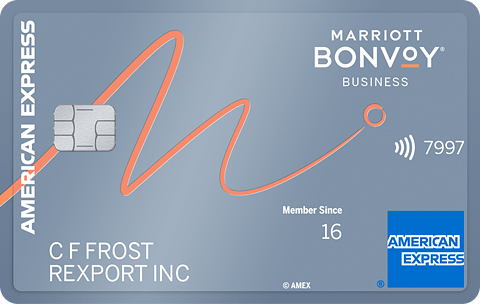
The Marriott Bonvoy Business® American Express® Card is a good option for small-business owners — but only if you’re a regular at Marriott properties.
This co-branded card includes Marriott-oriented perks that more than make up for the $125 annual fee: a generous welcome bonus, an annual free night award, Gold Elite status with Marriott Bonvoy and more. Because American Express isn’t universally accepted outside the US, you’ll get the most value from this card if most of your travels are domestic.
Pros and cons of the Amex Marriott Bonvoy Business card
Like any hotel credit card , the Marriott Bonvoy Business card comes with both pros and cons:
- Elevated earnings rates for hotels, restaurants and gas stations
- Free Gold Elite status with Marriott Bonvoy
- Free night certificate every year
- Generous welcome bonus
- No foreign transaction fees
- Comes with an annual fee
- Rewards are most valuable to regular Marriott customers
Learn more about Marriott Bonvoy Business card
Terms apply / Rates & fees
If Marriott is your preferred hotel brand, the Marriott Bonvoy Business card offers an attractive rewards program. Eligible purchases earn Marriott Bonvoy points, so you can charge business expenses to earn free nights.
Welcome bonus
If you spend $6,000 on purchases in six months from the date you opened the account, you’ll earn three Free Night Awards. Each of these nights is good for a hotel stay that’s worth up to 50,000 Marriott Bonvoy points. Certain hotels have resort fees. Terms apply.
Earn Amex Marriott Bonvoy Business card rewards
The Marriott Bonvoy Business card comes with an excellent rewards earning potential, especially if your job takes you to hotels in the Marriott family on a regular basis. You’ll earn points with every purchase, and even more with eligible hotel stays.
Here’s what you can earn in each spending category:
- 6X points for bookings at participating Marriott Bonvoy hotels
- 4X points on restaurants around the world, gas stations in the United States, cell phone service with U.S. carriers and purchases from U.S. merchants for shipping
- 2X points for all other purchases of goods and services
If you’re a Marriott Bonvoy member, you can earn even more — up to 10 Marriott Bonvoy points for every dollar you spend at qualifying properties with the Marriott Bonvoy Business card. Because the card comes with free Gold Elite Status, you’ll also get a 25% bonus. This applies to the room and anything you charge to it, including meals and spa treatments.
Redeem Amex Marriott Bonvoy Business card rewards
There are several ways to redeem your Marriott Bonvoy points.
The most popular is to book hotel stays. You can use the points to pay for bookings at hotels that participate in the Marriott Bonvoy program. This includes a mix of mid-tier and luxury properties, such as Delta, Four Points by Sheraton, Aloft, St. Regis and Le Méridien.
You can also transfer your points to more than 40 different airlines. If you do, the transfer ratio is typically three Bonvoy points to one airline mile. Some carriers have different ratios.
Alternatively, Marriott’s Air+Car Transfer Program enables you to use points to book flights and rental cars with hundreds of providers. However, keep in mind that many Marriott Bonvoy Business reviews note that this redemption option reduces the point value.
The Marriott Bonvoy Business Amex card has a slew of significant benefits. If your business requires a great deal of travel, these benefits can help you save money and enjoy a more luxurious experience.
Marriott Bonvoy Gold Elite status
When you’re approved for the Amex Marriott Bonvoy Business card, you automatically get Gold Elite status with Marriott Bonvoy. In addition to the points bonus, you’ll be eligible for free late checkout until 2 p.m. and enhanced room upgrades where available.
Free Night Award
For every year you have the Marriott Bonvoy Business card, you’ll get a Free Night Award for a hotel stay worth up to 35,000 points. If you charge $60,000 in one calendar year — an average of $5,000 per month — you’ll get another free night.
Marriott Bonvoy® room rate discount
Book a participating Marriott Bonvoy property with your Amex credit card, and you’ll have access to discounted room rates. Look for the “Amex Business card rate.” Combined with the standard Bonvoy member discount, it can save you up to seven percent off the regular rate.
15 Elite Night Credits
In addition to your annual free night certificate, you’ll earn 15 Elite Night Credits for every year you hold the Marriott Bonvoy Business Amex card. These credits help you move up from your complimentary Gold Elite status toward more premium Elite tiers. Each new level comes with additional benefits. For example, Platinum Elite comes with a 50% point bonus, better upgrades and a welcome gift.
Premium internet access
As an Amex cardholder, you don’t need to pay for upgraded internet access at Marriott Bonvoy hotels. Simply book an eligible rate, and you’ll get premium service for free.
Rental car insurance
Car rentals paid for with your Marriott business card include Amex loss and damage insurance. As long as you decline coverage through the rental company, you’ll be covered for up to $50,000 for damage to or theft of the car.
Baggage insurance
This insurance covers replacement costs if your baggage is damaged or lost. It only applies when you’re traveling with a common carrier on a ticket you paid for with your Amex card. Carry-on baggage is covered up to $1,250 per person. Checked bags are covered up to $500.
Purchase protection
Purchases you make with the Marriott Bonvoy Business card are covered for up to 90 days. If an eligible item is damaged by accident or stolen, you can get reimbursed for up to $1,000. This benefit maxes out at $50,000 per account, per year.
Extended warranty
When you buy a covered item with a warranty of five years or less, American Express will extend the coverage up to one extra year.
Amex Offers
The Amex Offers Program is another way to increase your point earnings. When you apply, you can choose from a variety of offers from different brands; take advantage of the offer, and you’ll get the rewards between five and 90 days after the offer ends.
Global Assist Hotline
When you’re traveling, you can call the hotline for help as needed. Operators can help you get cash in an emergency, make referrals for passport problems, coordinate legal or medical assistance, and more. Any trip that’s more than 100 miles from your home qualifies.
*Eligibility and Benefit level varies by Card. Terms, Conditions, and Limitations Apply. Please visit americanexpress.com/benefitsguide for more details. Underwritten by Amex Assurance Company.
Whether you intend to use the Marriott Bonvoy Business card for general company expenses or hotel stays, it’s important to understand the associated fees and rates ( see rates and fees ).
Amex Marriott Bonvoy Business card fees
The Marriott Bonvoy Business card has an annual fee of $125. If you’re a frequent Marriott customer, the fee is well worth the perks.
The yearly free hotel night is usually worth more than the annual fee. Add in the complimentary Gold Elite status and the high Bonvoy points earning potential, and it adds even more value.
The card doesn’t have foreign transaction fees, which is convenient if you travel internationally for work — as long as you’re making purchases where Amex is accepted, that is. There is no balance transfer fee, but you will be charged the standard interest rate. If you need a cash advance, you’ll pay the greater of $5 or 3% of the advance.
Amex Marriott Bonvoy Business card interest rates
Your annual percentage rate (APR) depends on American Express’ assessment of your creditworthiness. If you’re approved, you’ll pay a variable APR between 20.99% and 29.99%.
Here’s a look at the different variable APRs associated with this card:
American Express also charges a variable penalty APR of 29.99%.
You can be switched to this higher rate if you:
- Are late on payments twice in 12 months
- Fail to pay the minimum payment before the billing period closes
- Have a returned payment
The penalty APR stays in place for at least 12 billing periods. It will be removed after you have at least 12 periods with no late or returned payments.
Amex Marriott Bonvoy Business card credit limit
American Express sets your credit limit based on a variety of factors. Typically, these include your credit profile, existing debt, income and other financial factors
Compared to other hotel-branded credit cards, the Marriott Bonvoy Business card is a solid option for small businesses and regular business travelers.
It has a lower fee than traditional luxury travel cards, but you’ll still get plenty of value when staying at hotels that participate in the Bonvoy program. And with the included Gold Elite status and bonus earning categories, your Marriott stays will earn even more.
The main drawback with this card is the lack of flexibility in redeeming rewards. You can use them to book hotels, flights and rental cars, but Marriott redemptions offer the best redemption value. If your hotel stays and general travel needs tend to be more varied, a general travel credit card could be a better fit.
Marriott Bonvoy Business® American Express® Card vs. The Business Platinum Card® from American Express
While the Marriott Bonvoy Business® American Express® Card offers Marriott-focused rewards and benefits, The Business Platinum Card® from American Express is a more general-use travel and business card. It earns American Express Membership Rewards® points instead of Marriott Bonvoy points, which gives you a wider range of redemption options.
The Amex Business Platinum card is a higher-tier product. For the $695 annual fee ( see rates and fees ), it includes perks such as statement credits for up to $150 at Adobe Creative Solutions and up to $400 at Dell. You’ll also get free access to the American Express Global Lounge Collection®, up to $200 in airline credits and up to $189 in CLEAR Plus credit. Both cards include Gold Elite status with Marriott Bonvoy.
Read our full Amex Business Platinum card review
The Marriott Bonvoy Business card from American Express may be right for you if you run or represent a small business, travel often and prioritize Marriott properties for hotel stays. That’s because you’ll maximize reward earning potential and redemption value with stays at hotels that participate in Marriott Bonvoy.
A business card also makes it easy to keep your professional expenses separate, all while earning rewards. The annual fee is reasonable, and it’s easy to recoup the cost with the card’s many perks.
If you’re looking for more flexible redemption options, these other Amex business cards may be a better fit for you:
- Amex Business Gold card
- Blue Business Cash card
- Blue Business Plus card
You can learn more about the Marriott Bonvoy Business® American Express® card and apply online.
Getting approved for the Marriott business credit card is possible if you run a business (or represent one) and have strong credit — usually, this means a score of 700 or more. You must also be a U.S. resident, at least 18 years old and have a Social Security number.
Keep in mind that American Express has specific eligibility requirements for the welcome offer.
You aren’t eligible if you’ve had any of these Marriott credit cards from Chase within the 30 days before you apply:
- Marriott Rewards® Business Credit Card
- Marriott Bonvoy Business® Credit Card
- Marriott Bonvoy® Premier Plus Business Credit Card
- Marriott Rewards® Premier Plus Business Credit Card
The same applies if you’ve opened one of these Chase cards in the previous 90 days or received a bonus offer on one for being a new card member within the past two years:
- Marriott Bonvoy Boundless®
- Marriott Bonvoy Bountiful™ Credit Card
- Marriott Bonvoy Bold® Credit Card
Is the Amex Marriott Bonvoy Business card worth the annual fee?
The Marriott Bonvoy Business card from American Express is worth the $125 annual fee if Marriott is your preferred hotel brand. The card comes with one Free Night Award per year; when redeemed strategically, this alone is typically worth one to two times the annual fee.
Who is eligible for the Amex Marriott Bonvoy Business card?
To apply for the Amex Marriott Bonvoy Business credit card, you must be a business owner, at least 18 years old and a U.S. resident with a Social Security number. You may also be able to get the card if you run a sole proprietorship, you’re a freelancer or you’re an authorized representative of your employer.
Is the Amex Marriott Bonvoy Business card metal?
No. This American Express card is not metal. It’s plastic.
How do I get the free night awards with my Amex Marriott Bonvoy Business card?
There are a few ways to get Free Night Awards with the Marriott Bonvoy Business card, including meeting the spending threshold for the welcome offer. You’ll get an additional free night for every year you hold the card and every time you spend $60,000 or more in a year.
How can I upgrade to Platinum Elite Status?
To upgrade to Platinum Elite status with Marriott Bonvoy, you’ll need to stay for 50 qualifying nights per year. The Marriott Bonvoy Business card includes 15 annual Elite Night Credits, which means you need 35 additional stays.

Elizabeth Smith is an experienced travel and finance writer who specializes in topics including credit cards, travel insurance, and personal finance. Travel insurance, in particular, has both professional and personal significance for Smith. She’s traveled to 73 countries, and has extensive experience choosing and using various policies — she understands how valuable the right plan can be in an emergency, and loves to help readers find the perfect fit.
Smith comes to the world of finance from a scientific and technical background. She spent more than 10 years writing about engineering, science, and technology for universities and private companies. When she’s not writing or traveling, Smith can usually be found hiking or Nordic skiing.
Explore related articles by topic
- American Express
- Credit Card Reviews
- Compare Cards
- All Credit Card Articles
- Types of Credit Cards
- Learn The Basics: Credit Cards 101
- Credit Scores & Reports Explained
- Tips For Building & Rebuilding Credit
- Card Rewards & Perks
Best Credit Cards of April 2024: Which Should You Get?
Best Credit Cards for College Students in April 2024
The Best Travel Credit Cards of 2024
Best 0% Interest Credit Cards of April 2024 | 0% APR until 2025
Best Balance Transfer Credit Cards with 0% APR of 2024
Best Credit Cards with No Annual Fee in April 2024
Best Airline Credit Cards of 2024
Best Business Credit Cards of 2024
Best Starter Credit Cards If You Have No Credit History
Best Cash Back Credit Cards of 2024
Best Rewards Credit Cards of 2024
Best Credit Cards for Bad Credit 2024 | Cards for Credit Scores Below 690
Best Gas Credit Cards of April 2024
Best Hotel Rewards Credit Cards of 2024 | Earn Hotel Loyalty Points
Best American Express Cards of April 2024
Best Discover Credit Cards 2024
Best Chase Credit Cards of 2024: Travel, Cash Back, and More
Compare the Best Citi Credit Cards of 2024

What is a Good APR for a Credit Card?

What is a Bad Credit Score?

Does Closing a Credit Card Hurt Your Credit?

How Do Credit Cards Work? Understanding the Basics of Credit Cards

Difference Between Credit Cards and Charge Cards

How to Withdraw Money from a Credit Card - Cash Advances Explained

How to Build Credit: Steps to Build & Improve Your Credit Score

How Does Credit Card Interest Work? Understanding APR

What Is a Charge-off & How Can I Remove One from My Credit?

How to Increase Your Credit Card Limit Without Hurting Your Credit Score

What is the Credit Utilization Ratio? Calculate Your Ratio

How to Get Pre-Approved for an Amex Credit Card
Best Secured Credit Card of April 2024

How to Raise Your Credit Score Fast

What is a Good Credit Score? [And Why You Should Care]

How to Check Your Credit Score

How to Safely Get a Free Credit Report

How to Pay A Credit Card Bill - Payment Options & Tips

Differences Between a Soft Credit Check and a Hard Inquiry

Global Entry vs. TSA PreCheck: Which Should You Get?

How Many Credit Cards Should You Have? (Can You Have Too Many?)

What Are Credit Card Numbers & What Do They Mean?

Can I Pay My Mortgage with a Credit Card?

Can You Transfer Money From a Credit Card to a Bank Account?

Payment Methods You Can Use At Costco

Chase's Pay Yourself Back Feature: Is it Worth it?

Renting a Car With A Debit Card: Everything You Need to Know

CLEAR vs. TSA PreCheck: What You Need to Know
Best U.S. Bank Credit Cards 2024

Chase Sapphire Travel Insurance Coverage: What To Know & How It Works

2024 Complete Guide to American Express Travel Insurance
Amex Gold vs. Platinum Card: Detailed Comparison
American Express Gold Card Review 2024
Amex Platinum Card Review: Are its Benefits Worth the Cost?
Amex Platinum vs. Chase Sapphire Reserve
Find the Best American Express Business Card of 2024
Best Delta Air Lines Credit Cards of April 2024
Best Capital One Credit Cards: Rankings and Reviews
How to Use CardMatch to Get the Best Credit Card Offers
Capital One Venture X Credit Card Review: Is it Worth it?
Capital One Venture Card Review: Worth the $95 Fee?
Capital One Venture vs. Capital One Venture X
Capital One Quicksilver Card Review: Is it Any Good?
Capital One SavorOne vs. Quicksilver: Detailed Card Comparison
Capital One SavorOne Card: Cash Rewards for Fun-loving Foodies
Blue Cash Preferred Card from American Express Review 2024
Fortiva Credit Card Review: Is It Any Good?
Milestone Mastercard Review April 2024
Destiny Mastercard® Review April 2024
OpenSky Secured Credit Card Review April 2024 | Is it Right for You?
American Express Blue Cash Everyday Credit Card Review 2024
Delta SkyMiles Gold Amex Card Review April 2024
Delta SkyMiles Reserve Card Review: Is This Amex Card Worth It?
Delta SkyMiles® Platinum American Express Card Review
Capital One Venture X vs. Chase Sapphire Reserve
Capital One Platinum Card Review: Who Should Get This Card?
Capital One Platinum Secured Credit Card Review April 2024
Chase Sapphire Preferred Card Review April 2024
Is the Chase Sapphire Reserve Card Worth it? 2024 Review
Chase Sapphire Preferred vs. Reserve: A Detailed Comparison
First Progress Secured Credit Cards: What You Need To Know
Best Marriott Credit Cards of April 2024
Aspire Cash Back Reward Credit Card Review - April 2024
Capital One Spark Business Cards: Which Is the Best?
Best Southwest Rapid Rewards Credit Cards of April 2024
Self Secured Visa Credit Card Review April 2024
FIT Platinum Mastercard Review: Is It Worth It?
Marriott Bonvoy Brilliant American Express Card Review 2024
Hilton Honors American Express Card Review April 2024
United Explorer Card Review 2024: Benefits, Rewards & Fees
United Club Infinite Card Review: Is It Worth the Annual Fee?
Best United Airlines Credit Cards 2024: Which Should I Get?
Chase Sapphire Preferred vs. Capital One Venture: Which Is Best?
Chime® Credit Builder Secured Credit Builder Visa® Card
Chase Sapphire Preferred vs. Amex Gold: Which Card Is Better?
Chase Business Credit Cards: Your Complete Guide
Reflex Platinum Mastercard Review April 2024
Capital One Walmart Rewards Card Review: Earn 5% Cash Back
Capital One VentureOne Rewards Credit Card: Is It Worth It?

Instant Use Credit Cards You Can Use Immediately After Approval

Best Credit Card Sign-up Bonuses & Offers for New Cardholders
Chase Freedom Unlimited Review: Impressive Cash Back for No Annual Fee
Mastercard Black Card Review April 2024

Best Credit Cards for Building Credit April 2024

Amex Hilton Honors Surpass Card Review: Is It Worth It?

Delta Reserve vs. Amex Platinum: Card Comparison 2024

Amex Business Gold Card Review: Earn up to 4x Rewards Points

Amex Business Platinum Card Review 2024: Is It Worth It?

Amex Blue Business Cash Card Review April 2024

Amex Blue Business Plus Credit Card Review - April 2024

The Plum Card from American Express Review - April 2024
Amex Hilton Honors Business Card Review 2024
Surge Platinum Mastercard Review: A Good Card To Build Credit?
* Opinions expressed here are those of the LA Times Compare Cards Team and have not been reviewed or approved by any advertiser or entities included within this content. See our editorial policy for more details.
All products or services are presented in this content without warranty. The information, including card details such as rates and fees, is accurate at the time of publish. Please visit each bank's website directly for the most current information.
Policy Details
LA Times Compare is committed to helping you compare products and services in a safe and helpful manner. Our goal is to help you make sound financial decisions and confidently choose your next credit card.
We work to ensure that the information and advice we offer on our website is objective, unbiased, verifiable, easy to understand for all audiences, and free of charge to our users. We don’t feature all products and services available on the market but provide a wide range of options from top providers offered through Bankrate. Bankrate has partnerships with issuers including, but not limited to, American Express, Bank of America, Capital One, Chase, Citi and Discover.
View Bankrate’s privacy policy .
We can offer our services thanks to partners that compensate us. This may affect which products we write about and where and how product offers appear on our website – such as the order in which they appear. This does not affect our ability to offer unbiased reviews and information about these products; all partner offers are clearly marked. Given our collaboration with top providers, it’s important to note that our partners are not involved in deciding the order in which brands and products appear. We leave this to our editorial team who review and rate each product independently.
At LA Times Compare, our mission is to help our readers reach their financial goals by making smarter choices. As such, we follow stringent editorial guidelines to ensure we offer accurate, fact-checked and unbiased information that aligns with the needs of the Los Angeles Times audience. Learn how we are compensated by our partners.
A boomer who moved to Panama after years as a bartender in the Hamptons and New Mexico outlines the pros and cons of living in Central America
- George Stumpp, a retired bartender, lives comfortably in Panama after moving from New Mexico.
- Stumpp rents two properties as Airbnbs, supplementing his income in a country with good healthcare.
- He said Panama has robust infrastructure, a lower cost of living, and many of the same stores as the US.

George Stumpp, 65, worked as a bartender and bar supervisor in Long Island and New Mexico for decades. Realizing his retirement savings could go further in a different country, he settled in Panama .
In 2006, he and his wife bought a property on the outskirts of Panama City for $37,000 in cash, traveling back and forth until his retirement. After 15 years of going back and forth, he settled there permanently in 2021, renting out two casitas as Airbnbs to supplement his income. He's enjoying retirement in a country with a lower cost of living and high-quality healthcare, and he said he's enjoyed adapting to Panamanian culture.
"One of the reasons I chose Panama over other Central American countries is because we've got better infrastructure than anyplace else," Stumpp told Business Insider. "It's a thriving country, and a lot of that is based on income that they get from the Panama Canal ."
As the cost of living continues to increase, driven by elevated housing costs and still-high grocery bills, many American retirees are looking abroad for retirement. Some recent retirees previously told BI they're living much more comfortably in places like Colombia , Thailand , and St. Maarten .
Leaving the US
Stumpp grew up in the Hamptons on Long Island and eventually worked as a bartender for 15 years. He worked at rock 'n' roll clubs in the 1970s then found work at more upscale bars and restaurants.
As Long Island got more expensive, he decided to relocate to Sante Fe, where he had a cousin at the time. In 1993, he moved to Santa Fe with his then-girlfriend and her two kids.
He got a job at a luxury hotel downtown, working his way up the ranks to bar supervisor. For years, he managed the bar, from creating schedules to ordering inventory. As his kids got older, he started to vacation in Central America, traveling to Costa Rica , Belize, and Panama.
Related stories
His parents had retired to a lakefront cottage in Ontario, Canada, so he knew he wanted to retire abroad. In the mid-2000s, he started looking into purchasing a property in Belize , a predominantly English-speaking nation, although he and his wife ended up passing on it after noticing it wasn't as peaceful as they wanted it to be.
After reading more about Panama and seeing more Americans moving there, they took a lengthy trip searching for potential properties. He noticed he could get cheaper prices by calling the number on hand-painted signs outside homes instead of going through real estate websites, which would upcharge nonlocals.
Buying a home in Panama
He settled on a nearly half-acre property for $37,000 back in 2006 located three minutes from the beach, giving his Sante Fe home to his stepdaughter. The property had an old home that was falling apart, and he and his wife built a smaller house toward the back of the property with a bedroom, small kitchen, bathroom, and front porch. They split the old house in two as rental units. He owns his property outright with no mortgage, and his annual property tax is less than $100.
"We literally just took it apart — it was wired with extension chords, and it was in sad shape," Stumpp said. "We took it apart, put it back together again, and turned it into these two cute little Airbnb rentals. I'm not making a million dollars, but it's supplemental income."
After moving back and forth between Panama and the US for work for several years, he finally decided to retire and put his Santa Fe house on the market in 2021, noticing his home increased over $100,000 in value from the year before. He sold his convertible and bought an SUV, drove around the US for four months visiting friends and seeing national parks, and then flew back to Panama with his dog.
Moving to Panama permanently
He said over the last two decades, Panama's infrastructure has become much more robust than many other Central American countries. He said the city has good healthcare, a thriving financial scene, and plenty of big-box retailers and large chains.
Within 15 minutes of his house, he said there are four grocery stores, a Home Depot-like retailer, and many restaurant chains similar to those in the US.
"Anything I can buy in the States I can buy here. You might pay a little bit more for certain things, but then again, there's always alternatives," Stumpp said. "I can buy Kellogg's cornflakes and pay a lot of money, or I can buy the local cornflakes for a lot less."
Because he's over 60, he gets discounts on his utilities, doctor visits, public transportation, flights, and even movie theaters.
He's seen many large condominium complexes built along the beach that sell for about $300,000 with monthly maintenance fees of between $150 and $250. In his area, which has fewer tourists and expats, home prices are much lower, though he said sometimes houses can stay on the market for years without buyers.
His electricity fees are about $50 a month, while WiFi is $40 a month. His water bill is a miniscule $5 a month, and he rarely uses air conditioning, which keeps costs down. Still, he estimates his grocery bills are comparable to what he spent in the US, though going out to eat is slightly less.
"As more and more North Americans come down, prices on certain things like services have gone up," Stumpp said. "When I first got here, a hand carwash was $2, but now it's $10."
He loves the weather and living by water, and he's enjoyed becoming integrated into Panamanian culture over the past few years. Still, he said he's noticed a lot of Americans moving down to Panama who don't adapt to the culture, noting that some have left recently citing cultural differences. He said Americans should understand that they're guests in Panama and respect their neighbors, even if it means having to listen to loud music during a party.
"If you come down here to retire, it's not going to be like back home, and you're going to have to be flexible," Stumpp said. "There's some other old-timers here, and those are the ones that can adapt to life here, but there's those that can't."
Have you recently left the United States for a new country? Have you recently moved to a new state? Reach out to this reporter at [email protected] .
Axel Springer, Insider Inc.'s parent company, is an investor in Airbnb.
Watch: Vanishing island forces hundreds of Indigenous families to abandon homes
- Main content

IMAGES
COMMENTS
Being willing to travel lets management know that you are an all-in kind of employee, willing to go the extra mile. It will start to let them view you as more than just a "doer.". You will be exposed to higher profile projects. By traveling you will likely get to visit and be involved in higher profile projects.
A business trip can entail a wide variety of tasks or experiences, depending on the person or corporation you work for. The function of business travel is typically unique to each industry and profession. While trips may be a small and irregular occurrence for one company, another might rely on business travel to keep its workflow organized.
One of the primary advantages of business travel is the opportunity it presents for business expansion. Face-to-face meetings foster stronger connections, helping establish trust and credibility. Being physically present can make a significant impact when negotiating deals or forming partnerships. The ability to understand local markets and ...
Business travel is an indispensable part of today's corporate world, offering myriad benefits that drive productivity, foster growth, and enhance company culture. Companies can maximize these benefits by embracing strategic travel practices and utilizing platforms like AltoVita for efficient travel management while maintaining cost-effectiveness.
Here's everything you should know when it comes to the purposes, best practices, and policies around corporate business travel. ... How Taxes Work, and Pros and Cons. Updated Dec 18, 2023.
Always let people who are in the area of where you will be traveling know that you will be in town and offer to meet up with them. This is an excellent way to keep in touch, and to keep the channels of potential work and business open, both for you and for the people you are meeting. 3. Engage in travel sparingly.
Pros and cons of business travel. Cons; Traveling is great for broadening the mind and learning new things. However, if somebody has a family, there is definitely a price to pay. Missing family events may contribute to relationship difficulties.
Plus, business travel is a two-sided affair, it requires the people we are meeting (whether clients, partners or colleagues) to be open or able to meet in person. The re-adoption of business ...
Travel Companies Weigh the Pros and Cons of Business Trip Vacations Hotels tout a rise in hybrid work and personal travel, but employers don't always make such trips easy for workers
Global Mobility. Business Travel & Accommodation: Types and Decision Factors. 10th August 2023. Travel is a strategic component of global business. The seemingly simple act of getting from one place to another plays a crucial role in building relationships, nurturing growth, and defining a company's culture.
Business travel has long been a source of debate. There are both pros and cons to consider when considering business travel; one way of doing this is weighing the rewards against time and money costs. From networking opportunities to business insights gained in new places - there can be numerous positives associated with traveling for […]
Pro: OK, I try to eat well at least one night. Con: Eating in a fancy place and reading a book for company is not too fun. In addition, the goal is not to get fat while traveling. Most nights ...
To get you on the right track, here are the top benefits and downsides of business travel: Let's start with the pros: More Networking Opportunities. As aforementioned, networking opportunities are one of the biggest benefits that comes with international travel. Giving you and your employees the chance to attend a variety of trade shows and ...
Business travel and meetings have gathered significant momentum in the first half of 2022, and there's every indication that global governments, economies and companies are ready to put pandemic-era travel restrictions aside.... KEEP READING. Yet, the return to business travel won't be without its challenges. Travel demand has spiked along ...
The Future of Business Travel. The future of business travel is uncertain and will likely change depending on several factors. The current pandemic affecting the world since late 2019 has accelerated the adoption of virtual meetings and remote working, which has led to a decline in business travel.
Here's a look at the pros and cons of business travel and the reasons why business trips could be here to stay. Pro: First class travel. As the company is paying for the journey, you don't have to worry about covering the cost of your trip. You can pop lunch on expenses and could even have the chance to travel first class.
Switching to a managed business travel can transform corporate travel because of multiple benefits, such as: 1. Access to a unified portal. Business travel empowers employees, travel managers, and finance teams with round-the-clock access to a centralized platform through an app. Employees can book journeys, receive updates, and access emergency services while on the go.
Over time unfamiliar spaces and people can also become very exhausting. Mental and Physical Health: It is important to stay active and eat healthy for your physical and mental well-being, but this becomes much harder when you are constantly traveling. Expenditure: Travel is very expensive if you happen to be an independent consultant.
Business travel options- pros & cons. Here are a few of the different business travel options with the pros and cons for each so you can make a well-researched and informed decision on what is right for the employee, taking their specific requirements into account. Serviced apartments
Pros. 1. Job Security. Jobs that require frequent travel are always in demand. Flying airplanes, hauling freight, and keeping up foreign relations are jobs that must be done for a better world and consequently if you do your job well you seldom have to worry about being let go. 2.
According to the International Civil Aviation Organization, air travel accounted for 915 million tonnes of CO2 emissions in 2019, or about 2.5% of global emissions. By contrast, virtual meetings ...
Standing desks at the Sheraton Phoenix Downtown (Phoenix, Arizona) This isn't your grandma's Sheraton. Marriott has majorly overhauled the tired brand and the result is smart and sophisticated, with amenities galore for business travelers. Among our favorites is the downtown Phoenix property, the first of many Sheratons to be rebranded.
Travel is a learning experience. Seeing other parts of the world and immersing yourself in foreign cultures opens up completely new avenues of discovery. Travel in itself can be educational, and can open your eyes in ways you never thought possible. Through travel, you can become more aware - both of yourself, and the larger world around you.
Pricing starts at $1.98 per month and renews at $4.48 per month, making it one of the most affordable hosting services on our list. And for this, you'll get a free domain name, three websites ...
Delaware charges a minimum fee of $109 to incorporate, $50 for a certificate of good standing and fees to expedite the incorporation process. You must hire a registered agent and pay $50 each year ...
WAS Discovery Travel Insurance Review: Features, Pros and Cons. ... and has previously worked in the small business and start-up reporting space. ... Fast Cover Comprehensive Travel Insurance ...
In our opinion, Bluehost offers slightly more value than HostGator. Its affordability and ease of use make it a great option as a shared hosting service. Though HostGator offers a performance ...
Like any hotel credit card, the Marriott Bonvoy Business card comes with both pros and cons: ... The Business Platinum Card® from American Express is a more general-use travel and business card ...
Globe Life scored 798 on the latest JD Power US Individual Life Insurance Study. In short, the company earns consistently high marks from customers. Still, State Farm outranks Globe Life with a ...
A boomer who moved to Panama after years as a bartender in the Hamptons and New Mexico outlines the pros and cons of living in Central America Noah Sheidlower 2024-04-13T09:27:01Z